

Georgetown University 2023-24 Essay Prompt Guide
Early Action: Nov 1
Regular Decision Deadline: Jan 10
You Have:
Georgetown 2023-24 Application Essay Question Explanations
The Requirements: 1 essay of 250 words; 1 half-page essay; 2 page-long essays
Supplemental Essay Type(s): Activity , Why, Diversity
Prompt 1: Please elaborate on any special talents or skills you would like to highlight. (250 words)
This prompt may come first on the list, but we think you should save it for last! For the other essays on the Georgetown application, we ask you to dig deep and share personal stories that showcase talents and interests. Don’t dry the well by listing all of your (many!) skills and talents too soon. Every essay should reveal something new to admissions. So once you finish polishing your other pieces, ask yourself: what’s missing? Is there some critical puzzle piece that will help connect your other three essays? Or have you been dying to get something off your chest that didn’t fit anywhere else? This essay could be the perfect outlet for you to showcase your more personal skills, interests, and quirks. If the rest of your essays showcase your drive to work in international relations, perhaps your answer to this prompt could showcase a lighter side: your love of experimental cooking (and impressive knife skills!). Or maybe explain how learning a new language helped you learn how to whistle! While you should aim to showcase genuine skills that you have put effort into cultivating, you can also have a little bit of fun. This prompt is the most open-ended one on the application, so show admissions something they won’t find anywhere else on your application.
Prompt 2: Briefly discuss the significance to you of the school or summer activity in which you have been most involved. (approximately 1/2 page, single-spaced)
Next up is a fun twist on the classic activity essay, which asks you to expand on an extracurricular endeavor that you care about. For starters, we’d give you basically the same advice the prompt does: focus on one of the activities “in which you have been most involved.” Although we usually urge students to write about items that haven’t appeared elsewhere on their application, the activity essay is an exception since it specifically asks you to address an item on your resume. So, pick something with meat! When have you had the opportunity to take on a leadership role? How has four years of debate club shaped the way you communicate? Was it difficult coaching pee wee soccer as a freshman, and what motivated you to stick with it?
Prompt 3: As Georgetown is a diverse community, the Admissions Committee would like to know more about you in your own words. Please submit a brief personal or creative essay which you feel best describes you and reflects on your own background, identity, skills, and talents. (approximately 1 page, single-spaced)
Though it seems straightforward, this may be one of the hardest prompts! (What do you mean, tell you about myself in my own words?) Don’t fret. You can treat this essay just like the Common App’s prompt #1 , which asks students to write about a background, identity, interest, or talent that is so meaningful they believe their application would be incomplete without it. (Even better: if you’ve already written an essay in response to the Common App’s first prompt, you can recycle that essay here since Georgetown has its own application platform!)
If you’re approaching this essay from scratch, take some time to brainstorm. What about your background, talents, or identity might be worth highlighting for an admissions officer? Don’t worry about cramming every aspect of the wonder that is you into one essay; they will naturally reveal themselves along the way as you write. Whether you want to write about a facet of your identity that few people know about or a passion you’ve been dabbling in (and telling everyone about) for years, you can’t go wrong with authentic reflection and an engaging hook!
Georgetown University School-Specific Prompts.
(each school-specific prompt should not exceed 1 page, single-spaced), georgetown college of arts and sciences: a liberal arts education from the college of arts & sciences involves encounters with new concepts and modes of inquiry. describe something (a class, a book, an event, etc.) that changed your thinking. (applicants to the sciences, mathematics, public policy or languages are encouraged to include examples related to that field.).
Admissions wants to learn about a time when your mind was changed. If you’re an active reader or information seeker, you probably have a few ideas already. But if nothing comes to mind immediately, don’t panic; instead, think about the times in your life when you’ve had an “Aha!” moment that forced you to drastically re-examine one of your beliefs or understandings. Admissions wants to know that you are open to new ideas and can reflect in order to see things from a different perspective. As you tell your story, include sensory details to bring your experience to life, whether you’re sitting in the back of a classroom, head in your hands, trying to wrap your brain around the truth-bomb your teacher just dropped; or curled up in a blanket by the fireplace with your nose in a gripping book. If you’re deciding between “Aha!” moments to write about, pick the one most closely related to your intended field of study. Applicants who can articulate their thoughts and feelings while showcasing malleability and a willingness to thoughtfully consider new ideas will likely stand out as valuable additions to the Georgetown community.
School of Health: Describe the factors that have influenced your interest in studying health care at Georgetown University. Please specifically address your intended major (Global Health, Health Care Management & Policy, or Human Science).
If we know anything about applying to medical programs, it is this: everyone wants to help people; everyone wants to make the world a better place; everyone wants to make a meaningful contribution. Few fields lend themselves to service-oriented clichés and platitudes as readily as medicine does, so to safely navigate the minefield of hackneyed generalizations, start with something personal! What’s one eye-opening experience that made you believe healthcare could be your calling? Perhaps it was a single moment, like accidental eye contact with a concerned mother at the ER. Or maybe it was something more long-term, such as navigating your school in a wheelchair after knee surgery and realizing you want to improve patient outcomes through researching physical therapies. Whatever the case, use your personal story as the backdrop for your argument. What did you learn? What problems do you hope to tackle? What change do you hope to help create? As we said, it’s not enough to just want these things; your job is to show admissions why medicine interests you personally. Once you’ve accomplished that, be sure to address the role Georgetown will play in your plan for the future. In other words, why do you want to study healthcare at Georgetown in particular? Do they have a research lab that’s at the forefront of innovation? A wise applicant will do some research so they can infuse their response with specific details that demonstrate meticulousness and drive.
School of Nursing: Describe the factors that have influenced your interest in studying your intended major, Nursing.
Well, this is about as straightforward as prompts get! Our advice is much the same as it is for students applying to the School of Health (see above). Set yourself apart from other applicants by not only discussing the factors that led you to pursuing a career in nursing, but by also connecting those experiences to your larger goals for the future. If there are elements of a Georgetown education that will support your particular interest or connect to your past experiences in some way, you should dig into that in your response, while also revealing new information to admissions about your character, motivations, and aspirations.
Walsh School of Foreign Service: The Walsh School of Foreign Service was founded more than a century ago to prepare generations of leaders to solve global problems. What is motivating you to dedicate your undergraduate studies to a future in service to the world?
The Walsh School of Foreign Service wants to know what fuels your fire. What is driving you to dedicate your undergraduate studies (and maybe even your life!) to a path of service? Maybe you are incredibly passionate about combating climate change before it’s too late. What do you hope to achieve and how? Perhaps you’re following in the footsteps of a trailblazer you look up to—how do you hope to continue fighting the good fight in their honor? If you’re feeling stuck, ask yourself: what kind of mark would you like to leave on the world? How do you think you can positively contribute to a cause that is important to you? If you had the power to make a lasting impact in any area at all, what would it be? While building the personal connection is key, you’ll also want to leave yourself some space to spell out at least a few steps you might take to address your global issue of choice.
McDonough School of Business: The McDonough School of Business is a national and global leader in providing graduates with essential ethical, analytical, financial and global perspectives. Please discuss your motivations for studying business at Georgetown.
If you think we’ve never seen an essay with the line, “I love money,” you would be wrong. Spoiler: this does not make a great first impression. Studying business is about so much more than dollars and cents, and the prompt offers a few other aspects of business you’ll learn about in this program including “ethical, analytical, financial and global perspectives.” In order to get some perspective, we’d recommend doing your homework. Like any classic why essay, the best answers are personal and specific, so go beyond your general interest in business and try to figure out specifically why Georgetown could be the right fit for you. Is it the location? The professors? The travel opportunities? Allow yourself to follow every lead and fall down every rabbit hole as you root through the program website. Your essay should paint a picture of the kind of student you will be at Georgetown, from the classes you’ll take to the activities you’ll pursue. How will this education prepare you for your dream career?
About Kat Stubing
View all posts by Kat Stubing »
We're here to help.
Contact us for information on rates and more!
- I am a * Student Parent Potential Partner School Counselor Private College Counselor
- Name * First Last
- Phone Type Mobile Landline
- Street Address
- Address City State / Province / Region Afghanistan Albania Algeria American Samoa Andorra Angola Anguilla Antarctica Antigua and Barbuda Argentina Armenia Aruba Australia Austria Azerbaijan Bahamas Bahrain Bangladesh Barbados Belarus Belgium Belize Benin Bermuda Bhutan Bolivia Bonaire, Sint Eustatius and Saba Bosnia and Herzegovina Botswana Bouvet Island Brazil British Indian Ocean Territory Brunei Darussalam Bulgaria Burkina Faso Burundi Cabo Verde Cambodia Cameroon Canada Cayman Islands Central African Republic Chad Chile China Christmas Island Cocos Islands Colombia Comoros Congo Congo, Democratic Republic of the Cook Islands Costa Rica Croatia Cuba Curaçao Cyprus Czechia Côte d'Ivoire Denmark Djibouti Dominica Dominican Republic Ecuador Egypt El Salvador Equatorial Guinea Eritrea Estonia Eswatini Ethiopia Falkland Islands Faroe Islands Fiji Finland France French Guiana French Polynesia French Southern Territories Gabon Gambia Georgia Germany Ghana Gibraltar Greece Greenland Grenada Guadeloupe Guam Guatemala Guernsey Guinea Guinea-Bissau Guyana Haiti Heard Island and McDonald Islands Holy See Honduras Hong Kong Hungary Iceland India Indonesia Iran Iraq Ireland Isle of Man Israel Italy Jamaica Japan Jersey Jordan Kazakhstan Kenya Kiribati Korea, Democratic People's Republic of Korea, Republic of Kuwait Kyrgyzstan Lao People's Democratic Republic Latvia Lebanon Lesotho Liberia Libya Liechtenstein Lithuania Luxembourg Macao Madagascar Malawi Malaysia Maldives Mali Malta Marshall Islands Martinique Mauritania Mauritius Mayotte Mexico Micronesia Moldova Monaco Mongolia Montenegro Montserrat Morocco Mozambique Myanmar Namibia Nauru Nepal Netherlands New Caledonia New Zealand Nicaragua Niger Nigeria Niue Norfolk Island North Macedonia Northern Mariana Islands Norway Oman Pakistan Palau Palestine, State of Panama Papua New Guinea Paraguay Peru Philippines Pitcairn Poland Portugal Puerto Rico Qatar Romania Russian Federation Rwanda Réunion Saint Barthélemy Saint Helena, Ascension and Tristan da Cunha Saint Kitts and Nevis Saint Lucia Saint Martin Saint Pierre and Miquelon Saint Vincent and the Grenadines Samoa San Marino Sao Tome and Principe Saudi Arabia Senegal Serbia Seychelles Sierra Leone Singapore Sint Maarten Slovakia Slovenia Solomon Islands Somalia South Africa South Georgia and the South Sandwich Islands South Sudan Spain Sri Lanka Sudan Suriname Svalbard and Jan Mayen Sweden Switzerland Syria Arab Republic Taiwan Tajikistan Tanzania, the United Republic of Thailand Timor-Leste Togo Tokelau Tonga Trinidad and Tobago Tunisia Turkmenistan Turks and Caicos Islands Tuvalu Türkiye US Minor Outlying Islands Uganda Ukraine United Arab Emirates United Kingdom United States Uruguay Uzbekistan Vanuatu Venezuela Viet Nam Virgin Islands, British Virgin Islands, U.S. Wallis and Futuna Western Sahara Yemen Zambia Zimbabwe Åland Islands Country
- Which best describes you (or your child)? High school senior High school junior College student College grad Other
- How did you find CEA? Internet Search New York Times Guidance counselor/school Social Media YouTube Friend Special Event Delehey College Consulting Other
- Common App and Coalition Essays
- Supplemental Essays
- University of California Essays
- University of Texas Essays
- Resume Review
- Post-Grad Essays
- Specialized Services
- Waitlist Letters
- Private School Essays
- General College Counseling
- School list with priorities noted:
- Anything else we should know?
- Name This field is for validation purposes and should be left unchanged.
School Stats:
- Agnes Scott College
- Alvernia University
- American University
- Amherst College
- Babson College
- Bard College
- Barnard College
- Baylor University
- Bennington College
- Bentley University
- Berry College
- Bethany College
- Bishop’s University
- Boston College
- Boston University (BU)
- Bowdoin College
- Brandeis University
- Brown University
- Bryn Mawr College
- Bucknell University
- Butler University
- California Institute of Technology (Caltech)
- California Lutheran University
- Capitol Technology University
- Carleton College
- Carnegie Mellon University
- Catawba College
- Centre College
- Chapman University
- Claremont McKenna College
- Clark University
- College of Mount Saint Vincent
- College of William and Mary
- College of Wooster
- Colorado College
- Colorado School of Mines
- Columbia University
- Cornell University
- Culver-Stockton College
- D'Youville University
- Dartmouth College
- Davidson College
- Drexel University
- Duke University
- Earlham College
- Elon University
- Emerson College
- Emory University
- Flagler College
- Fordham University
- George Mason University
- Georgetown University
- Georgia State University
- Georgia Tech
- Gonzaga University
- Harvard University
- Harvey Mudd College
- Haverford College
- Hillsdale College
- Hofstra University
- Illinois Institute of Technology
- Illinois Wesleyan University
- Indiana University Bloomington
- Ithaca College
- Johns Hopkins University
- Kalamazoo College
- Lafayette College
- Lehigh University
- Lewis and Clark College
- Linfield University
- Loyola Marymount University (LMU)
- Lynn University
- Macalester College
- Malone University
- Manchester University
- Marist College
- Mary Baldwin University
- Massachusetts Institute of Technology (MIT)
- Meredith College
- Monmouth College
- Moravian University
- Morehouse College
- Mount Holyoke College
- New York University (NYU)
- North Park University
- Northwestern University
- Occidental College
- Oklahoma City University
- Olin College of Engineering
- Pepperdine University
- Pitzer College
- Pomona College
- Princeton University
- Providence College
- Purdue University
- Rensselaer Polytechnic Institute
- Rice University
- Saint Elizabeth University
- Santa Clara University
- Sarah Lawrence College
- Scripps College
- Seattle Pacific University
- Smith College
- Soka University of America
- Southern Methodist University
- St. John’s College
- Stanford University
- Stonehill College
- Swarthmore College
- Syracuse University
- Texas A&M University
- Texas Christian University
- The College of Idaho
- The George Washington University
- The New School
- Trinity College
- Tufts University
- Tulane University
- University of California
- University of Central Florida (UCF)
- University of Chicago
- University of Cincinnati
- University of Colorado Boulder
- University of Florida
- University of Georgia
- University of Illinois Urbana-Champaign
- University of Maryland
- University of Massachusetts Amherst
- University of Miami
- University of Michigan
- University of Minnesota
- University of North Carolina at Chapel Hill (UNC)
- University of North Carolina at Charlotte
- University of North Carolina at Greensboro
- University of Notre Dame
- University of Oklahoma
- University of Oregon
- University of Pennsylvania
- University of Pittsburgh
- University of Richmond
- University of San Diego
- University of San Francisco
- University of Southern California (USC)
- University of Texas at Austin
- University of Tulsa
- University of Vermont
- University of Virginia (UVA)
- University of Washington
- University of Wisconsin-Madison
- Vanderbilt University
- Vassar College
- Villanova University
- Virginia Tech
- Wake Forest University
- Washington and Lee University
- Washington University in St. Louis
- Wellesley College
- Williams College
- Worcester Polytechnic Institute (WPI)
- Yale University

Want free stuff?
We thought so. Sign up for free instructional videos, guides, worksheets and more!

One-On-One Advising
Common App Essay Prompt Guide

Supplemental Essay Prompt Guide
- YouTube Tutorials
- Our Approach & Team
- Undergraduate Testimonials
- Postgraduate Testimonials
- Where Our Students Get In
- CEA Gives Back
- Undergraduate Admissions
- Graduate Admissions
- Private School Admissions
- International Student Admissions
- Common App Essay Guide
- Supplemental Essay Guide
- Coalition App Guide
- The CEA Podcast
- Admissions Stats
- Notification Trackers
- Deadline Databases
- College Essay Examples
- Academy and Worksheets
- Waitlist Guides
- Get Started
How to Write the Georgetown Supplemental Essays: Examples + Guide 2023/2024

TABLE OF CONTENTS
- How to write each supplemental essay prompt for Georgetown
- Prompt #1: “Special talents/skills” essay
- Prompt #2: “Extracurricular activity” essay
- Prompt #3: “Personal/creative” essay
- Prompt #4: School-specific essays
Located in Washington, DC, and providing an outstanding academic experience, expansive internship opportunities, and robust collegiate athletics, it isn’t hard to see why Georgetown is a popular college choice for many social seniors. Georgetown’s application offers a traditional blend of writing prompts, including a personal statement, a “Why us?” essay for several of its colleges, and an extracurricular essay. Though the prompts may be standard, the tips, ideas, and examples below can help you stand out from the field.
Before you begin writing, you may want to get deeper insights into the kind of student Georgetown is looking for, and how it views itself. You’ll find an extensive, by-the-numbers look at its offerings, from enrollment and tuition statistics to student life and financial aid information, on its Common Data Set . For a better sense of how Georgetown envisions its role in academia and how it wants to grow and evolve, read its strategic plan .
What are Georgetown's supplemental essay prompts?
Please elaborate on any special talents or skills you would like to highlight. (250 words)
Briefly discuss the significance to you of the school or summer activity in which you have been most involved. (Approximately one-half page, single-spaced)
For all applicants: As Georgetown is a diverse community, the Admissions Committee would like to know more about you in your own words. Please submit a brief personal or creative essay which you feel best describes you and reflects on your own background, identity, skills, and talents. (Approximately one page, single-spaced)
Prompt #4: School Specific Essays
APPLICANTS TO GEORGETOWN COLLEGE: A liberal arts education from the College of Arts & Sciences involves encounters with new concepts and modes of inquiry. Describe something (a class, a book, an event, etc.) that changed your thinking. (Applicants to the sciences, mathematics, public policy or languages are encouraged to include examples related to that field.) (Approximately one page, single-spaced)
APPLICANTS TO THE SCHOOL OF HEALTH: Describe the factors that have influenced your interest in studying health care at Georgetown University. Please specifically address your intended major (Global Health, Health Care Management & Policy, or Human Science). (Approximately one page, single-spaced)
APPLICANTS TO THE SCHOOL OF NURSING: Describe the factors that have influenced your interest in studying your intended major, Nursing. (Approximately one page, single-spaced)
APPLICANTS TO THE WALSH SCHOOL OF FOREIGN SERVICE: The Walsh School of Foreign Service was founded more than a century ago to prepare generations of leaders to solve global problems. What is motivating you to dedicate your undergraduate studies to a future in service to the world?
APPLICANTS TO THE MCDONOUGH SCHOOL OF BUSINESS: The McDonough School of Business is a national and global leader in providing graduates with essential ethical, analytical, financial and global perspectives. Please discuss your motivations for studying business at Georgetown.
How to Write Each Supplemental Essay Prompt for Georgetown University
How to write georgetown supplemental essay prompt #1.
Picking a Topic:
While you may have heard us encourage students to write with focus, preferring a deep dive on one topic over a brief mention of many, this prompt asks for talents and skills , so don’t hesitate to touch on your numerous abilities you haven’t had a chance to show elsewhere in your app.
To get started, set a timer for three minutes . Then, list as many skills and talents as you can. Don’t limit yourself to the ones you’d put on a job application. Consider talents large (communicating) and small (sharpening pencils just the right way), academic (naming any Shakespeare play based on only a couple lines) and non-academic (knowing which one of your siblings are home based on how many dishes are in the sink). For this essay, and especially for this brainstorm, almost any idea can work.
Have your list ready? Ok. Pick four to seven of your favorite ones. Choose a variety—this is a great chance to add some personality to your application, share some of your quirks, and show you’re a well-rounded applicant.
Here’s a strong example:
Over time, I have worked to develop a vocabulary whose nuance reflects the thoughtfulness with which I view the world. To do that, every day after school, I add a branch to my word board. * * * Meraki— a Greek word— means “to do something with soul, creativity, or love,” to leave a piece of yourself in your work. When I play the harp, I select pieces that lay bare my inner condition. At home, I cook with meraki: my brother has many dietary restrictions, and my desire to give him satisfying meals drives me to innovate new recipes that redefine his experience of eating. * * * Array is a term in programming that means “index out of bounds error.” When I founded Code Autism and invented RIPPL, I looked “out of bounds” to bring these ideas into reality. * * * Sonder— the notion that each person has a life as complex as your own— is expressed as well in my relationship with my brother. As he is nonverbal, I have learned to interpret his facial expressions and emotional needs without speech, something that informs my interactions with others on a daily basis. * * * 毅力, or perseverance, informs not only my role in my family, but also my physical pursuits. As a result of studying Tae Kwon Do, I have mastered one hundred consecutive push-ups and can break a wooden board with a jumping roundhouse kick. As a blue belt, I am empowered to defend not only myself, but also others. — — —
Tips + Analysis:
Share different sides of yourself. By choosing to share her talent for curating a nuanced vocabulary, this writer is able to touch on her interests in playing harp, cooking, taking care of her brother, programming, and Tae Kwon Do.
Ground your special talents and skills to values. Notice how the author does this in the example above (harp → vulnerability, cooking → care, programming → service, Tae Kwon Do → discipline, defending others).
Show range by balancing the academic/impressive with the personal/human. A young woman who founds a non-profit like Code Autism and invents an app like RIPPL is likely to impress a reader, but the impact is enhanced by the humility of caretaking for her brother. Her toughness is showcased through Tae Kwon Do, but balanced with the vulnerability of composing for the harp.
How to Write Georgetown Supplemental Essay prompt #2
This is your basic extracurricular activity essay, and will double with many other prompts from other schools. Already written an extracurricular essay you love? Copy, paste, and call it a day.
If not, you can view a thorough, step-by-step guide to writing the essay at this link , or keep reading here for some tips on choosing a topic and a strong sample essay written specifically for Georgetown.
Picking a Topic
Here are a few steps you can take to identify a topic.
Go to your activities list and pick 2-3 possible topics.
Go through the BEABIES exercise (either mentally or by filling out the chart) to decide which topic might yield the most content.
Double check with your personal statement to make sure you’re showing some side of yourself that’s not currently being discussed at length there.
Let’s check a couple examples.
Example: Narrative + Overcoming a Challenge
Because this student is writing about overcoming a challenge, she uses a narrative structure, telling a linear story and explaining what she walked away with.
If there were a “cry graph” for the number of times students at my school broke down from freshman to junior year, it would increase exponentially. We often found ourselves weeping together in philosophy class, one of the only safe spaces to open up emotionally about the constant pressure we all experienced. I was alarmed at the number of times I heard “I’m going to kill myself” in the classroom on a daily basis, and my closest friend confessed that she considered quitting school. In short, my school community was very, very stressed. These red flags led me to decide that it was time to change the picture of the cry graph and create a space other than philosophy class where we could support each other, so I founded the Psychology and Mental Health Club. I researched empirically proven de-stressing methods, and found that yoga, art therapy, and canine therapy can lower blood pressure and cortisol levels while increasing oxytocin levels. I organized stretching and doodle sessions, and collaborated with the library to host therapy dogs so that students could ‘paws’ and relax. After each event, we asked students to indicate their mood before and after; 96% of students responded that their stress decreased. I am elated to say that the Mental Health Club seems to have successfully reversed the ‘cry graph.’ We have become a mindful, supportive, tight-knit community, and we are no longer defined by anxiety--rather, we are now defined by our dedication to mental health awareness and balance. I have received numerous requests to continue and expand the club’s work, so we plan to hold our sessions every two weeks, and to introduce meditation, calming music, herbal teas, and other mindfulness activities that I continue to explore. — — —
This author uses her extracurricular essay to explain how she overcame a challenge in her school community. You can find a whole host of tips and ideas for this narrative style extracurricular essay here , but the following are a few quick takeaways:
Raise the stakes. We need to know why we should care about the challenge your extracurricular activity is working to solve. When this author shares the commonality of hearing students’ suicidal ideation, we can see why this is an important problem to solve.
Be specific about what you did. This author not only explains that she created a club, she also details both the distinct steps she took to generate a solution and the specific services her club offered.
If possible, share quantitative outcomes. We all probably trusted that the therapy dog sessions were effective (see: any puppy ever), but this author drives that point home with data : 96% of post-session student responses showed a decrease in stress.
Example: Montage + Making Connections
This student uses a montage structure for his essay, using different aspects of the extracurricular activity (debate) to demonstrate interest and achievement in a whole host of areas (philosophy, critical thinking, public service, self-awareness, self control)
Initially, debate seemed nonsensical: lambasting opponents while arguing improbable scenarios. But over time I’ve learned that it’s more than competition that drives me to stay up all night looking for evidence: I love learning about the political and ideological underpinnings of our society and the way they shape us. On an easy debate tournament weekend, I research foreign diplomatic agendas and synthesize the information into coherent debate evidence. When tournaments become more hectic, however, I delve deeper into the works of philosophers and social critics and translate the knowledge into debate argumentation. While researching foreign policy, critical theory like Heideggerian phenomenology and constitutional details, I’ve developed an ability to critically analyze argumentation, make sense of the world around me and creatively express myself in an academic setting. My hard work has paid off. In the past four tournaments, I’ve received a Top 10 speaker award for the varsity division consisting of about 50 debaters. This trend has increased my credibility in my debate league to such a level that my partner and I were invited to participate in a series of public debates at LA City Hall to defend the water policy for the drought. The opportunity allowed me to actually impact the public’s awareness and accept a larger responsibility in the workings of my community. More importantly, however, debate has taught me to strategically choose my battles. When I prepare my arguments, I know that I can’t use all of them in the end of a round. I have to focus. I’ve learned to maximize my strengths and not try to conquer everything. Moreover, I’ve learned to be responsible with my choices. A wrong argument can mean losing if we can’t defend well. Not only do I now know how to zoom in from a bigger picture, but I also know how to pick the right place to zoom in to so I can achieve my goal. Debate has turned me into an responsible optimizing, scrutinizing and strategizing orator. — — —
As with the earlier example, you can find a wealth of tips for an “uncommon connections” style here . You can also find some distilled tips and ideas below.
Identify skills and learnings you’ve gained from the extracurricular activity, and where else those skills show up. This author has three primary takeaways from debate: an interest in philosophy, becoming a more vocal and active community member, and the ability to choose his battles. In your essay, you can earn bonus points by highlighting unexpected places those skills have shown up. This author could have cited the way she applied a philosophical concept to a drama performance she did, or how her participation in the LA City Hall debates led to her attending a climate march.
Organize your essay effectively by addressing each connection in its own paragraph. One possible structure for each paragraph is:
Name the skill or takeaway
How does it show up in your extracurricular activity?
How does it show up somewhere else, possibly unexpectedly?
Summarize the takeaways clearly. This is even more important if your takeaways are uncommon or unexpected. This author names each outcome of her engagement with the debate team in her closing sentence: responsibility, efficiency, a critical eye, and the ability to strategize.
How to Write Georgetown Supplemental Essay #3
As Georgetown is a diverse community, the Admissions Committee would like to know more about you in your own words. Please submit a brief personal or creative essay which you feel best describes you and reflects on your own background, identity, skills, and talents. (Approximately one page, single-spaced)
Your Common App personal statement will usually also work well for this Georgetown prompt. Generally, “approx 1 page” means around 600 words. According to the G’town admission office, though, the essay just needs to fit on one page. Don’t push that too far (we don’t want readers running to find a magnifying glass), but we suggest writing a draft that’s around 600 words and making it fit after the fact.
Here’s an example of a Common App personal statement that doubled nicely for this Georgetown prompt.
The ocean has always been outside my door. I’ve moved several times within my home state of Connecticut, but even in unfamiliar places I’ve always been able to rely on its presence. The ocean reminds me of the good in my life: boating with my family in the summer months, and lobstering as the weather grew colder. I loved it despite my father throwing me into a bloom of sea jellies when I was eight. This love and appreciation grew as I became older, along with my desire to learn more, so this past summer I worked as a camp counselor at the Mystic Aquarium. I expected to learn about young children and camp activities, but I actually learned a lot about human behavior by observing sea life. As a camp counselor, I was in charge of sixteen 3-6 year-olds. I was thrown into a world of snacks, line up ropes, and play time. Each of the kids had their very own personality, aptly developed in their few years on earth. I was asked a billion questions: “How many penguins are there?” (36), “How deep can a seal dive?” (300 to 400 feet for up to 30 minutes). I learned new ways to interact and communicate with the kids. I talked slower, used fewer words, and developed a deep curiosity for the students' favorite colors. What I had not expected was that I would also be learning, and that the animals would be my teachers. For example, the six sea lions live together in an outdoor enclosure. While many people assume the 1,100 pound male Astro runs their simulated outdoor environment, it is actually the 300 pound older female named Eden. She may not look in charge, but as the matriarch she keeps order. Eden taught me that even though I may not be big and scary, I can still lead. Whether as Head of Student Activities, organizing bonding activities for students, or as Head of our ‘Bowl-A-Thon’ fundraiser, I can use my skills—communication, empathy, and resourcefulness, among others—to be an effective leader. The 36 penguins also live in their own community. They groom each other, swim, and eat together. Penguins gather together for warmth and protection, and all newcomers are welcomed into the community. This reminds me of my freshman year when I left home for the first time. I felt lost in my new habitat, but now, almost four years later, I have found my space and a group of girls who have become my community. They have been my support system, and my school has become a second home. Clams are essential to many ecosystems, yet are often overlooked by the aquarium’s guests. One of our giant clams (so overlooked he doesn’t even have a name) was facing a death sentence due to the deterioration of the valve holding his shell together. A team of aquarists came together and used their resources to keep the clam alive. He became the little guy everyone was rooting for. As I moved to new schools (five in total), I often felt like an overlooked clam. Now as I find myself becoming one of the oldest at my school, I look out for clams in need of some extra care and find a way to keep them together. When people think of aquariums they typically conjure up images of exotic fish, dolphins, belugas, and turtles. These large sea creatures usually assume the spotlight, but there are many others, and even the smallest clam has an important role in its community. I have learned the inherent and foundational value of hard, often unseen work, along with the well earned grandeur of larger, outward-facing accomplishments. One is essential to the other. The ocean has highlighted for me the value of everyone’s contributions and the importance of community, qualities which will serve me well in college and beyond. — — —
Reach for Less Common Connections. People read essays about sports and expect them to be about hard work. They read essays about volunteering and expect them to be about selflessness. You know what they don’t expect? An essay about an aquarium really being about human nature. The less common connections made throughout this story help paint a unique picture of the writer. And note that while the less common topic (aquarium) helps, it’s the connections and insights that are more important. Meaning you can possibly make essays about sports and volunteering work—you’ll just have to spend a good chunk of time exploring how they connect to things we probably don’t expect them to (like, say, literature, or healthy boundaries, or…).
Let details be your voice. We learn, for example, that the writer worked with “3-6” year olds in the third paragraph of the essay. But rather than simply saying, “they asked me a lot of questions,” the writer uses specific details to put us in those moments. More than just simply relaying questions the kids asked, the writer also intersperses each question with their own narration (e.g., “‘How many penguins are there?’ (36)”). The details help us experience what the author did, while offering elements of voice that communicate the writer’s depth of understanding.
The thread is your guide. This writer’s montage essay consists of a series of examples of life-lessons learned through different experiences working at the Mystic Aquarium. The aquarium is their guiding thread . Using specific examples from their work related to that thread, they manage to reveal various key insights. Ultimately, each example (i.e., the clams, sea lions, penguins, and 3-6 year olds) reveals something about how the writer has come to understand the importance of an individual’s contributions in the context of a group. That’s some pretty cool stuff coming from an essay about an aquarium. A key takeaway: your “topic” is really just an excuse to help a college see the values/insights/skills/qualities/interests you bring to the campus.
How to Write Georgetown Supplemental Essay Prompt #4
Depending on which college within Georgetown you’re applying to, you’ll have a different prompt to address here.
APPLICANTS TO GEORGETOWN COLLEGE: A liberal arts education from the College of Arts & Sciences involves encounters with new concepts and modes of inquiry. Describe something (a class, a book, an event, etc.) that changed your thinking. (Applicants to the sciences, mathematics, public policy or languages are encouraged to include examples related to that field.) (Approximately one page, single-spaced) APPLICANTS TO THE SCHOOL OF HEALTH: Describe the factors that have influenced your interest in studying health care at Georgetown University. Please specifically address your intended major (Global Health, Health Care Management & Policy, or Human Science). (Approximately one page, single-spaced) APPLICANTS TO THE SCHOOL OF NURSING: Describe the factors that have influenced your interest in studying your intended major, Nursing. (Approximately one page, single-spaced) APPLICANTS TO THE WALSH SCHOOL OF FOREIGN SERVICE: Briefly discuss a current global issue, indicating why you consider it important and what you suggest should be done to deal with it. (approximately one page single-spaced) APPLICANTS TO THE MCDONOUGH SCHOOL OF BUSINESS: The McDonough School of Business is a national and global leader in providing graduates with essential ethical, analytical, financial and global perspectives. Please discuss your motivations for studying business at Georgetown. (approximately one page single-spaced)
At their core, most of these prompts are asking for a “Why Georgetown?” response. Here’s a complete guide on how to write the “Why us?” essay —read through it and pay close attention to the “Why Cornell” and “Why Penn” examples (our favorites).
A note on Georgetown College:
The Georgetown College prompt is asking about an experience that changed your thinking, but in many ways that’s just the beginning—it’s seeking a window into your intellectual curiosity, adaptability, and depth of thought. Admissions officers are on the lookout for applicants who are not just passive absorbers of information, but active thinkers and learners, willing to challenge their preconceived notions (note GTown’s direct value of “ restless inquiry ”).
So understanding that—where do you begin?
First, you might imagine your mind as a vast library full of all the books you've ever read, classes you've attended, and oddball YouTube videos you've watched at 3 AM. Somewhere in there, tucked between "Why I'm Afraid of Spiders" and "That Time I Ate Too Much Chocolate", is a transformative experience—one that played a lead role in reshaping your thinking. Maybe it's about that Calculus class that made you see the world as an intricate web of patterns, or perhaps a philosophical podcast that turned your worldview upside down. Don’t think, though, that this has to be something where you believed A, and then after the experience you believed the opposite of A—transformative experiences are frequently more subtle and nuanced than that. Note that although they explicitly encourage “applicants to the sciences, mathematics, public policy or languages…to include examples related to that field,” you could definitely tailor your examples to your academic interests even if they’re not included in any of the ones named. With that in mind, this essay can take on a bit of a “ Why Major? ” flavor in which your “mini-movie” is related to some formative class / book / event / etc… from your past.
A note on the Walsh School of Foreign Service:
The Walsh School of Foreign Service was founded more than a century ago to prepare generations of leaders to solve global problems. What is motivating you to dedicate your undergraduate studies to a future in service to the world?
The Walsh School of Foreign Service is one of the most well-regarded programs in the country for students interested in global issues and international relations. So this essay needs to be next-level if you want to have a chance. Here are some quick tips:
Committing to a college path dedicated to developing the tools needed to address worldwide issues is heady stuff, and it typically comes from a deep-seated desire to not just to help others but do so on a global scale. So what’s the story of your inspiration? Why foreign service? Was it a personal experience that had a profound effect on your outlook on the world? Or do you have a more general interest in effecting lasting change? If so, why? To brainstorm some ideas, it may help to think of this as a “Why Major” essay, with foreign service as the “major.” Here’s a complete guide to the “Why Major” essay .
You might use this as an opportunity to describe work you’ve done around a particular issue, one that stirred in you an intense urge to tackle a specific global concern. Past students, for example, have described work they’ve been doing on gender rights, the climate crisis, and everything in between. If this sounds like you …
Consider doing the Elon Musk exercise to tease out some material—only, in addition to “what you did” and the “impact you had,” you’ll want to add a 7th, even more important component: what impact do you hope to have in the future? And maybe even: How can SFS equip you to do that?
In answering the last sentence of the prompt, consider describing how the work/research you’ve done on a significant issue has revealed to you how complex this issue is. What makes it complex? What are the forces in play? How has that inspired a future in foreign service? Show us how your brain works, and how your heart is fully engaged.
If you do choose to write about a specific topic of global significance, become a semi-expert on your topic. In other words, research it enough so that you’re pretty sure you know more than your reader about it. This may take some time, but it’s worth it. Chances are, other students applying to SFS have spent considerable time either working on or studying their topic of choice, so showing you know your stuff will improve your chances of standing out.
Quick Note: If all this sounds way too intense, ask yourself: Do I want to be a Hoya? Or do I really, really want to go to SFS? If you’re not super interested in/excited about being in SFS, maybe consider just applying to Georgetown. If you’re not sure, definitely do some more research.
Action Items:
Reflect on what you want out of your college experience. Collect those insights using this chart . Identifying specific or niche interests and needs will help you find equally specific resources at Georgetown and make your “we’re a perfect match” (see more on this at the “complete guide” link above) case more compelling.
Spend at least an hour researching 10+ reasons why Georgetown might be a great fit for you, mapping them out in the third column of the chart.
Remember, we don’t want to prove that Georgetown is the best school for every student—we want to prove that it’s the best fit for you. This means that, for all the specifics you provide about Georgetown, you’ll also want to explain why those specifics appeal specifically to you . You’ll see examples of this in the sample essay below.
Create an outline based on either Approach One, Approach Two (recommended), or Approach 3 (as explained in our “Why us?” guide ).
Georgetown College essay example
In history class, the dialogue surrounding the Civil Rights Movement often presents African Americans as a unified group fighting to resist racist policies. But James Baldwin’s The Fire Next Time, written in 1963, helped me understand that the nuances of African American resistance have often involved strained personal relationships within African American families. Early in this book, Baldwin retells a childhood experience where his father discouraged him from staying in school because he thought a higher level of education didn’t help African Americans enter the professional sphere. Baldwin recalls encountering “too many college-graduate handymen,” but refuses to drop out of school, mostly as an act of defiance towards his father. Baldwin continues to describe experiences that heightened the tension between him and his father—particularly regarding religion, parental control, and life on the streets. Although resisting white oppression was difficult for Baldwin, resistance often caused divides in his personal relationships, which was more draining. Before reading this book, it had never occurred to me that overcoming the barriers perpetuated by racism in some cases involved taking a break from one’s traumatized community, which in this case was Baldwin’s own father. I can relate. My father and I have differing methodologies for informing ourselves of current events and choosing to support a political candidate. My father makes his decision based on the political party, overall impact the candidate will have in the government, and major news headlines, while I believe in learning all the details about the candidate, doing extensive research on their speeches and personal history, looking at which influencers support them, and following their updates on social media. These small differences have caused my father and I to disagree in some political conversations. I used to doubt my own perspective when my father and I discussed politics, but Baldwin’s essay taught me to hold my own ground while also respecting my father’s opinion. It also taught me to critically reflect upon my own values. Social problems play out in personal ways. The Fire Next Time has helped me find the balance between acknowledging strains in personal relationships while learning how to grow as an activist. Reading about Baldwin’s experience has helped me draw parallels to my personal struggles, and helped me combat my unconscious assumption that all African Americans have experienced the consequences of white oppression in the same way. — — —
Tips + Analysis
Show how the piece changed, broadened, or challenged previously held beliefs. The key to this essay is to show how the thing you chose to write about contributed to your growth—how it gave you “insight or inspiration.” So, think about doing that in two parts: first by describing the belief or perspective you started with (the status quo), then by explaining how your viewpoint evolved. In her intro, this student starts right out with a summary of both: “In history class, the dialogue surrounding the Civil Rights Movement often presents African Americans as a unified group fighting to resist racist policies. But James Baldwin’s The Fire Next Time, written in 1963, helped me understand that the nuances of African American resistance have often involved strained personal relationships within African American families.” That’s a nice way to establish the essay’s theme from the beginning.
Make it personal. Remember, this is an essay about you, not so much the work you chose. You will, naturally, have to spend some of your word budget talking about the piece, especially as it relates to the idea or perspective that inspired or enlightened you. This student spent 100 words on Baldwin’s perspective—a quarter of the essay. We wouldn’t recommend using much more than that. But the student then quickly dives into the insight she gained, how “overcoming the barriers perpetuated by racism in some cases involved taking a break from one’s traumatized community.” Even more instrumental was showing how she related to Baldwin’s experience, through her political disagreements with her own father. But she doesn’t stop there. In demonstrating her growth, the student is clear about how she applied what she learned: “Baldwin’s essay taught me to hold my own ground while also respecting my father’s opinion. It also taught me to critically reflect upon my own values.”
Show how your growth has impacted your life in other ways. If you can demonstrate that the lessons you took away from the piece inspired you in multiple ways, all the better. For this student, in addition to having a new outlook on her political conversations with her father, she learned to “find the balance between acknowledging strains in personal relationships while learning how to grow as an activist,” while also learning to “draw parallels to my personal struggles,” and “combat my unconscious assumption that all African Americans have experienced the consequences of white oppression in the same way.”
Convey key values you want Georgetown to see. One of the most important goals of this essay is to show Georgetown what’s meaningful to you and why. That means conveying key values, especially those you share with Georgetown. This essay is teeming with strong values: empathy, compassion, social change, curiosity, accountability, diversity, quality relationships, respect, love.
Consider being vulnerable. Expressing vulnerability makes the essay more relatable, allowing the reader to connect with you on a more personal level. You can show vulnerability in multiple ways—with self-deprecating humor, by revealing embarrassing details, by sharing secrets or deeply personal information. This student is vulnerable in describing some over-generalized beliefs she had about the African-American experience, which some people may be shy about revealing for fear of judgment. Sharing that perspective makes her growth, and her willingness to embrace it, all the more meaningful.
4. APPLICANTS TO THE WALSH SCHOOL OF FOREIGN SERVICE
In the last quarter of 2019, the Lebanese people, suffering from dire economic conditions, had been protesting their government’s inefficiencies, corruption, and inability to govern, demanding the resignation of its sectarian leaders. People from across different sects—Sunnis, Shias, Christians—united in an attempt to overthrow the ruling government. At the root of the crisis is the makeup of Lebanon’s sectarian government, which was solidified as a solution to end the Civil War in 1990. The system divides power evenly among the three religious groups fighting for control of Lebanon—with the presidency allocated to a Maronite Christian, the prime ministership to a Sunni Muslim, and Speaker of Parliament to a Shia Muslim. However, while the system ended the war, it created new challenges by turning warlords into politicians loyal only to each of their own religious factions. As the government became a source of personal gain, the Lebanese people were forced to rely on patronage and clientelism, feigning allegiance to their religiously affiliated political parties to gain basic needs such as a job, healthcare, or education. The situation came to a head on August 4, 2020, after two consecutive explosions shook Beirut, leaving nearly 200 dead, 6,500 injured, 300,000 displaced, and US$10-15 billion in damage. The explosions took place in Lebanon’s main port, in a storage facility that illegally stored ammonium nitrate, a highly explosive chemical, triggering a new round of demonstrations over the government’s mismanagement. Using the slogan “all of them means all of them,” the Lebanese people demanded the government’s entire ruling body step down, but while the Prime Minister resigned, the corrupt sectarian government remained in power. This sectarian power divide has made Lebanon vulnerable to foreign interference in addition to its implications for the people of Lebanon. While Shia leaders aligned with Iran, the Sunnis are with the U.S.-allied Arab Gulf states, and the Christians are with France. With the backing of foreign nations, the different factions within Lebanon have become emboldened to spread their ideology throughout the Middle East and beyond. The Shia faction, called Hezbollah, has funded terrorist groups in other countries, such as Yemen, Bahrain, and Iraq, threatening the safety of the global community. As a Bahraini, I feel a special bond to Lebanon. Ours are two of the few Middle Eastern countries with religious and ethnic diversity, and their people have coexisted and intermarried over centuries. I am a product of that diversity: a half-Sunni and half-Shia, like many in Lebanon. It saddens me that although the people of Lebanon are united despite their sects’ differences, their government’s system divides them, threatening their safety and the peace and prosperity of the region. The Lebanese government should follow Bahrain's example in how it resolved protests and brewing conflicts that erupted from the Arab Spring: launch an independent inquiry to investigate human rights violations and initiate a national dialogue, which can be a first step toward restoring human rights and establishing a merit-based democratic system of governance. The leadership must take advantage of the French government’s support and President Macron’s proposal for international financial aid, which is conditioned on the government’s economic and political reforms and was also welcomed by the wealthy Gulf Arab states. But this international support requires serious political and economic steps inside Lebanon. Even if the sectarian power-sharing system cannot be abolished (or will not abolish itself), it has to reset its priorities so that all three offices of the government provide the Lebanese people with basic rights. This national dialogue must generate a plan of action that focuses on economic prosperity, not sect loyalty, and abolishes the government’s use of quotas when filling its jobs. — — —
Dive deep into your chosen global issue. This essay manages to offer a nuanced view on the protests in Lebanon despite its (necessary) brevity—no easy feat. Readers have no doubt that this writer understands the complexities of the geopolitical situation they’re describing. The writer seems as though they’ve already worked to develop the kind of understanding we’d expect them to explore freshman year at Georgetown. Language like this shows that the writer understands how complex situations are built on one another.
Make it personal. Though this writer is not Lebanese, they find various ways to connect their experiences to their overarching topic (e.g., “As a Bahraini,” and “a half-Sunni and half-Shia, like many in Lebanon”). This personal connection reinforces our understanding of the writer's genuine interest in the issue; the writer isn’t just interested in global affairs as an abstract concept, but sees its impact on an experiential level.
How will you play a role? No one expects you to have solved a massive geopolitical conflict before entering college (though, if you have, definitely consider writing about that!). All the same, it’s important to show readers that your interest in Foreign Affairs isn’t the interest of a spectator—colleges in general and Walsh in particular want students who aspire toward a “future in service to the world.” How do you hope to engage on the issues you raise? In addition to demonstrating their impressive understanding of the conflict in Lebanon, the writer ends the essay by suggesting measures the Lebanese government can adopt, drawing inspiration from Bahrain.
4. APPLICANTS TO THE MCDONOUGH SCHOOL OF BUSINESS:
The McDonough School of Business is a national and global leader in providing graduates with essential ethical, analytical, financial and global perspectives. Please discuss your motivations for studying business at Georgetown.
Cosmopolitan: not the magazine or drink, but a word that has stuck with me since my freshman year history class description of Ancient Rome. It was defined as a place where humans from different backgrounds, countries, and beliefs can come together and learn from each other while still maintaining their unique identities. This idea of an international community full of new ideas and people has always excited me. Although I cherish the small and quaint communities that I grew up in, and appreciate the diverse and thought-provoking perspectives Miss Porter’s has ingrained in me, I am looking forward to expanding my growth immersed in a bustling city. I believe that Georgetown will offer me the opportunity to be part of a vibrant, cosmopolitan community, where smart, engaged students from around the world will come to trade ideas and create lifelong relationships. I want an interdisciplinary education that prepares me for a career outside of college. Georgetown’s Business and Global Affairs major combines the curricula of The McDonough School of Business and School of Foreign Service. This will allow me to explore my interest in political affairs, while also learning about the business world. I have taken ‘Accounting from Debt to Equity’ and ‘Microeconomics’ at my school, giving me a solid background for classes offered at McDonough such as ‘Global Business Experience’. Georgetown also has many opportunities outside my intended major. Having attended an all-girls school, I have found a safe and productive space working with other women. I would love to get involved with The Period Empowerment Project and Georgetown’s Women's Center to continue developing these valuable relationships. Georgetown’s location coupled with unique business programs, including the The McDonough School of Business/Walsh School of Foreign Service interdisciplinary Bachelor of Science in Business and Global Affairs, will provide and prepare for transformative internship possibilities at the White House and Congress. These opportunities will help me develop the necessary skills and language to communicate in the business world. Conversely, I can also learn outside of Georgetown’s campus and surrounding community. For example, the ‘Georgetown in Barcelona: Business Ethics and Marketing’ study abroad program will allow me to dive into topical issues such as sustainability. The education of the whole student, as stated in Georgetown's motto “cura personalis”, means learning in and outside the classroom. A Georgetown education will help me become a well rounded, community-focused, “cosmopolitan” leader who can help make meaningful and informed contributions to the world. — — —
Hook ‘em! While it’s the body of your essay that ultimately carries the weight, the first sentence/s of your essay is an important moment. It sets the tone for the essay, and, most importantly, it can make the reader want to keep reading. This writer hooks the reader by differentiating a unique term’s (“cosmopolitan”) popular associations to offer a profound insight into global unity and diversity. Playing with the reader’s commonly held notions is one tried and true way to start an essay, and if you’re interested in more ways to “hook” a reader, check out this blog post .
Show them you’re not just window shopping. It’s one thing to simply say “I’m interested in taking X class.” It’s quite another to demonstrate how specific courses you’ve taken in high school will prepare you for specific courses in your time at college. This writer notes that taking “Accounting from Debt to Equity” and “Microeconomics” in high school prepares them to take “Global Business Experience” at McDonough. Note that the writer didn’t just open up a course catalog and pick a McDonough class that sounded kinda cool. Instead, we get the sense that the writer has put some thought into what they’ll be tackling in McDonough’s courses and has mapped out some of the possible arc of their education, demonstrating their informed interest in the School. Want some help organizing your own research into the school’s you’re applying to? Check out our guide on that here .
It’s not just about the major. Did you catch the writer’s mention of the Period Empowerment Project and Georgetown’s Women's Center? It's as if they've already penciled in their first club meeting. The result is that they’re demonstrating their interest in the applications of McDonough’s classes; they’re not trying to simply study the coursework for its own sake. This shows they've not only done their homework but also mapped out their college journey. They’re signaling: “I'm ready to learn, engage, and truly be a Hoya!” They’re also demonstrating how they want to be an active, engaged member who contributes to the community—some colleges’ prompts directly ask this question (“how will you contribute?”), but even for colleges that don’t, it can be a nice touch to add some detail that helps your reader see how you want to engage.
Special thanks to Nick Muccio for writing this blog post.

Rather than candy, Nick (he/him) went searching for people’s vacuum cleaners when trick or treating. He’s since found other ways to help people clean, usually involving their essays (though he has great ideas on carpet maintenance, too). He earned a degree in Psychology from Bates College, where he rowed boats and acted in plays. Teaching high schoolers English for seven years taught him about the importance of presence and knitting sweaters. He sweats a lot, usually on purpose, and usually involving running shoes, a bike, or a rock climbing harness. His greatest fear? Heights. His greatest joys? Numerous, though shared laughter is up there.

How to Write the Georgetown Supplement 2023-2024
Okay, we’ll level with you here: Georgetown doesn’t go through the Common App, so you have to jump through a few additional hoops to apply directly through their system. Their defense? Having their own application allows them to “fulfill [their] commitment to this holistic admissions process” and “allows [their] applicants to best express their personalities, talents, skills and accomplishments.” Our personal opinion? The initial online form and subsequent application supplement are pretty standard, so… Sometimes people just need to feel special. (Get in line, George!) Speaking of special, last year Georgetown had an acceptance rate of just 13% for incoming freshmen.
Let’s quickly go over the Georgetown highlights. Located in our nation’s capital, this Catholic, Jesuit school is a prestigious private university defined by its proximity to Capitol Hill, its historic past, and its cultural commitment to social justice. You’ll want to keep these cornerstones in mind and work diligently on your supplemental essays to set yourself apart as an applicant.
Applying to Georgetown
Before you can get to the meat of your application — those essay questions — you’ve got to get your application in the system. First, fill out this preliminary form . Within 24 hours, you will receive an email allowing you to create your application account, and from this platform you can continue with your application supplement.
Like all applications, the majority of these forms is paperwork, and the questions will be familiar to you. However, each applicant will need to write three original responses — one short answer, two brief essays — to complete the supplement (you can view a reference copy here ), and we’ll take a closer look at those prompts in this blog post.
The Short Essay
Briefly (approximately one-half page, single-spaced) discuss the significance to you of the school or summer activity in which you have been most involved.
Remember, all space on an application is precious, so don’t repeat yourself here! Because they ask about the activity with which you have been most involved, you will already have listed it in the extracurricular section, which asks you to start with the commitments most important to you. When we say “don’t repeat yourself” here, we don’t mean that you need to choose an activity that doesn’t appear in that list, because that would mean you’re writing about something you didn’t spend enough time on to bother including it on your activity list. What we mean is this: use the space you have to elaborate on this activity to strategically present new information about yourself.
The written portions of an app help an admissions committee to get to know you as a real person and not just a resume, and you’ll want to get your most prominent personality traits across. Choose a quality you’d like to emphasize, and tell a story about your activity that demonstrates that characteristic. This story should have a beginning, middle, and end, and your conclusion should tie back to your future at Georgetown. Reference a similar club or organization at Georgetown that you’d like to join — there’s no contract that will hold you to this if you change your mind, but articulating your intention to keep building on your experience will prove you’ve done your research and that you’ll be an involved undergraduate and positive presence on campus.
Here’s an example. Let’s say you want to convey your ~scrappy resilience~ in your application, and the club you were most involved in during high school was your local chapter of Amnesty International. Of course, your readers will know that this activity means you have a passion for social justice and human rights, but what they might not know is that, despite ranking math as your least favorite subject, you accepted the role of treasurer sophomore year because it was the only open position and you wanted to join the leadership committee as early as possible. Maybe you had to learn the fundamentals of accounting on your own, but you took the initiative to ensure your chapter’s fundraising efforts were successful because of your dedication to that year’s campaign to support girls’ equal access to education globally.
Full Essay #1
ALL APPLICANTS: As Georgetown is a diverse community, the Admissions Committee would like to know more about you in your own words. Please submit a brief personal or creative essay which you feel best describes you and reflects on your own background, identity, skills, and talents. (approximately one page, single-spaced, typed)
As you can tell, this prompt is broad , but it boils down to “tell us about yourself.” Because the essay can be personal or creative and only asks that you describe yourself in your own words, this is a great opportunity to use your Common App Essay.
Full Essay #2
You’re almost to the finish line, now, but this second essay is a bit of a “choose your own adventure.” Well, that’s the fun way to put it. Technically speaking, incoming first-years must apply to one of five schools within Georgetown, so your second essay depends on which program you’d like to enter. We’ll briefly look at all five, so bear with us.
APPLICANTS TO GEORGETOWN COLLEGE: A liberal arts education from the College of Arts & Sciences involves encounters with new concepts and modes of inquiry. Describe something (a class, a book, an event, etc.) that changed your thinking. (Applicants to the sciences, mathematics, public policy or languages are encouraged to include examples related to that field.)
The College of Arts & Sciences asks you about an anecdote, related to your future field, that “changed your thinking.” Once again, you’ll need to tell a story that illustrates how you became passionate about your intended major or specialization. This time, the framework for telling that story should involve changing your mind — admissions wants to ensure you’re compatible with a liberal arts approach to undergraduate study.
Be specific. Your story should illustrate how you developed your interest, and communicate in detail what that interest is — a particular problem you’d like to tackle or a sub-topic within a broader field. After that, reference research you’ve done about opportunities at Georgetown that indicates why it’s the best place to pursue your goals. We recommend you mention at least two upper-level classes offered in the course catalog and one scholar with whom you’d like to study, research, or mentor.
Your goal here is twofold: demonstrate your open-mindedness, flexibility, and willingness to grow, and get across your “why” (why you need to study this subject at Georgetown as opposed to any other school).
APPLICANTS TO THE SCHOOL OF HEALTH: Describe the factors that have influenced your interest in studying health care at Georgetown University. Please specifically address your intended major (Global Health, Health Care Management & Policy, or Human Science).
While similar to the prompt above, the School of Health’s instructions are a bit broader. You’ll still need to specify your intended major from the three tracks offered, and you’ll want to point to specific courses, professors, and local research that interests you. In this case, the only difference is that the story of how you chose healthcare is allowed to be broader — it doesn’t hinge on a change in thinking but rather the development of your inclination toward healthcare however you see it.
APPLICANTS TO THE SCHOOL OF NURSING: Describe the factors that have influenced your interest in studying health care. Please specifically address your intended major Nursing.
This one’s almost identical to the School of Health essay, so you can use the same strategy. Just make sure that your research — and your passion for healthcare — refer to the nursing track rather than global health, healthcare management & policy, or human science.
APPLICANTS TO THE WALSH SCHOOL OF FOREIGN SERVICE: The Walsh School of Foreign Service was founded more than a century ago to prepare generations of leaders to solve global problems. What is motivating you to dedicate your undergraduate studies to a future in service to the world?
Once again, you need to give the backstory of how you became interested in foreign service work. After you have sketched your personal journey, tie in specific details about the Walsh School’s classes, faculty, and unique programs, especially as they relate to your stated interests. This is important . “Global problems” are, understandably, pretty gigantic and abstract, and no one can master everything. To strengthen your application to Georgetown’s foreign service program, you should define your niche by showing that you are knowledgeable in a specialized area — that might be a global problem as it manifests at a local level or a subtopic within international relations.
APPLICANTS TO THE MCDONOUGH SCHOOL OF BUSINESS: The McDonough School of Business is a national and global leader in providing graduates with essential ethical, analytical, financial and global perspectives. Please discuss your motivations for studying business at Georgetown.
Last but not least, we’ve got our future wolves of Wall Street. The McDonough School of Business asks about your motivations, which means you should not only give your background (how you came to have a passion for entrepreneurship) but should articulate what you plan to focus your study on and how this degree will aid the vision you have for your future.
Let’s face it, “motivations” is a loaded word, and you need to share your intentions — not just what you plan to do, but why you want to do it. In other words, it’s not a great look to say you want to start paving your way toward an elite Masters in Business program so you can get filthy rich. This prompt highlights “ethical, analytical, financial, and global” lenses to hear what applicants have to say about how business analysts and economists conceive of their work as having an influence on, and being influenced by, the quality of life on a societal and individual level, the relationships between sectors and countries, and the nuances of policy and regulation, just to start. These frameworks are not random, so make sure that your essay relates your motivations to the perspectives they’ve listed in the prompt.
When looking at these five secondary prompts, dare we say… “same, same, but different?” We do. Yes, each school has a slightly different preamble and approach to the question, but ultimately all five essay options want to know why this field and, implicitly, why this field at Georgetown?
Scanning the Georgetown application might be intimidating at first, but in the end a great supplement is a pretty simple recipe. You’re just telling admissions what you already know: why Georgetown is ideal for achieving your aspirations, and why you’d be a wonderful addition to the Hoyas.
Looking for specialized help on school-specific supplements? Reach out to us today.
The Ivy Coach Daily
- College Admissions
- College Essays
- Early Decision / Early Action
- Extracurricular Activities
- Standardized Testing
- The Rankings
September 9, 2023
2023-2024 Georgetown University Supplemental Essay Prompts

Georgetown University has released its 2023-2024 admissions essays for applicants to the Class of 2028 . The Jesuit institution, which has for years bucked the trend of joining The Common Application , asks applicants to respond to three essays in addition to one essay that is school-specific within the broader university. So, what are this year’s essay prompts? Let’s dive in!
2023-2024 Georgetown Essay Topics and Questions
Essays for all georgetown applicants.
All Georgetown applicants must answer the following three essay prompts
1. Please elaborate on any special talents or skills you would like to highlight (250 words) .
Applicants should focus on a skill related to the hook they’ve showcased in the activities section of their Georgetown application. After all, Georgetown’s admissions committee doesn’t care if an applicant can juggle. Even if the skill doesn’t relate to the student’s hook, the talent must showcase intellectual curiosity or it’s a wasted opportunity.
2. Briefly discuss the significance to you of the school or summer activity in which you have been most involved (approximately 1/2 page, single-spaced) .
Applicants should shine a spotlight on one of their more meaningful activities. And, yes, this activity should relate to the student’s hook. If a student is interested in studying political science, the activity they write about for this essay prompt should not relate to physics. Georgetown’s admissions committee wants to see how applicants are going to make the world better in a small but meaningful way. As such, this is an opportunity to show rather than tell how they’ve done that to date through the prism of a specific extracurricular pursuit.
3. Georgetown is a diverse community, the Admissions Committee would like to know more about you in your own words. Please submit a brief personal or creative essay which you feel best describes you and reflects on your own background, identity, skills, and talents. (approximately 1 page, single-spaced)
It’s unsurprising that unlike many of its peer institutions, Georgetown has made few changes to its application in the wake of the U.S. Supreme Court ruling outlawing Affirmative Action. After all, Georgetown’s longtime Dean of Admissions Charles Deacon is well known for his aversion to change. For example, it took a worldwide pandemic for the man to finally switch to notifying applicants of their decisions via the Internet rather than snail mail.
While this essay is similar to last year’s third essay prompt required of all applicants, the wording is slightly different. Unlike last year’s prompt, Georgetown has included “background” and “identity.” Last year, the prompt read, “As Georgetown is a diverse community, the Admissions Committee would like to know more about you in your own words. Please submit a brief essay, either personal or creative, which you feel best describes you.”
Now, keep in mind that some schools, like Johns Hopkins University , included bold language that very much capitalized on the loophole Supreme Court Chief Justice John Roberts penned in his majority opinion outlawing Affirmative Action , allowing schools to continue to consider a candidate’s race in context: “Nothing in this opinion should be construed as prohibiting universities from considering an applicant’s discussion of how race affected his or her life, be it through discrimination, inspiration, or otherwise.” Georgetown, unsurprisingly, didn’t go nearly as far in its language under its reluctant-to-modernize admissions czar — but it’s a step nonetheless.
Students need not be underrepresented minorities to answer this prompt powerfully. Students can instead write about their faith, community, or experiences, but we do encourage applicants who are underrepresented minorities to subtly make it clear since Georgetown, like all highly selective universities, continues to wish to admit a diverse class of students.
Georgetown School-Specific Essays
For the school-specific essay, irrespective of the school, the essay should not exceed one page, single-spaced.
Georgetown College of Arts and Sciences
A liberal arts education from the College of Arts & Sciences involves encounters with new concepts and modes of inquiry. Describe something (a class, a book, an event, etc.) that changed your thinking. (Applicants to the sciences, mathematics, public policy or languages are encouraged to include examples related to that field.)
Georgetown’s admissions committee wants to understand how an applicant thinks. Through a specific anecdote or anecdotes (no matter a student’s chosen field of study) — be it via a book, event, classroom discussion, lecture, or anything — it behooves applicants to shine a light on how they are filled with conviction. Yet, they’re also malleable to change when presented with better ideas. And, of course, it wouldn’t hurt to pepper — by showing rather than telling — the importance of the Jesuit tradition and, in particular, Cura personalis, in their storytelling.
McDonough School of Business
The McDonough School of Business is a national and global leader in providing graduates with essential ethical, analytical, financial and global perspectives. Please discuss your motivations for studying business at Georgetown.
This essay prompt presents applicants with an opportunity to share an origin story — as high schoolers rather than as children — for their interest in business. Ideally, the origin story traces to an activity featured in the student’s Georgetown activities section. And, of course, McDonough isn’t looking to admit future business titans just out for money. They want to understand how applicants will make the world better in a small but meaningful way. As such, McDonough applicants should infuse their essays with Jesuit traditions — and why they matter to them in business. And, yes, this essay should also be infused with Why McDonough and Why Georgetown specifics (and, no, name-dropping professors and listing classes don’t count as genuine specifics).
Walsh School of Foreign Service
The Walsh School of Foreign Service was founded more than a century ago to prepare generations of leaders to solve global problems. What is motivating you to dedicate your undergraduate studies to a future in service to the world?
Walsh is looking to learn the origin story of an applicant’s interest in foreign service — as high schoolers rather than as children. Through a specific anecdote or anecdotes, which ideally trace back to the student’s activities so they’re showing rather than telling, applicants should highlight how they hope to leave a mark on the wall in a way that can be actualized. Stopping climate change can’t be actualized. Incentivizing countries to be greener — based on specific research and insights — is much more doable.
School of Health
Describe the factors that have influenced your interest in studying health care at Georgetown University. Please specifically address your intended major (Global Health, Health Care Management & Policy, or Human Science).
Georgetown’s School of Health seeks to understand a student’s origin story, as a high schooler, for their interest in the disciplines under the School of Health’s umbrella. A grandparent becoming ill with breast cancer is not the way into such an essay since it’s all too common and doesn’t say enough about how a student thinks and how they wish to leave a mark on their field.
Instead, applicants should tell a small story that ideally relates to an activity they’ve participated in during high school, that showcases precisely why they want to contribute to the health field and how they hope to make a difference — and always in a small but deeply meaningful way.
Ivy Coach’s Assistance with Georgetown Essays
If you’re interested in submitting essays that will wow Georgetown’s admissions committee, fill out Ivy Coach ’s free consultation form , and we’ll be in touch to outline our college admissions counseling services for seniors.
You are permitted to use www.ivycoach.com (including the content of the Blog) for your personal, non-commercial use only. You must not copy, download, print, or otherwise distribute the content on our site without the prior written consent of Ivy Coach, Inc.
Related Articles

What Are the Consequences of College Essay Plagiarism?
May 16, 2024

Using A.I. to Write College Admission Essays
October 13, 2023

Word and Character Limits in College Essays
September 27, 2023

What English Teachers Get Wrong About Writing College Essays

Bragging in College Essays: Is It Ever Okay?
September 26, 2023

What Not to Write: 3 College Essay Topics to Avoid
September 24, 2023
TOWARD THE CONQUEST OF ADMISSION
If you’re interested in Ivy Coach’s college counseling, fill out our complimentary consultation form and we’ll be in touch.
Fill out our short form for a 20-minute consultation to learn about Ivy Coach’s services.
The Ultimate Guide to 2022-23 Georgetown Essays
The recording will load in a moment., the admissions process is hard - alexander is here to help, schedule a free consulation to meet alexander and get your questions answered, get help with:.
Interested in working with Alexander?
Learn about the entire admissions process from a top expert, about this livestream.

Join college consultant Alexander Oddo and CollegeVine co-founder Vinay Bhaskara to learn how to write effective, compelling, and admission worthy responses to the 2022-2023 Georgetown essays!
This stream will be interactive so be sure to drop all your questions in the chat below.
Alexander Oddo
Specialties, other recordings by alexander oddo.
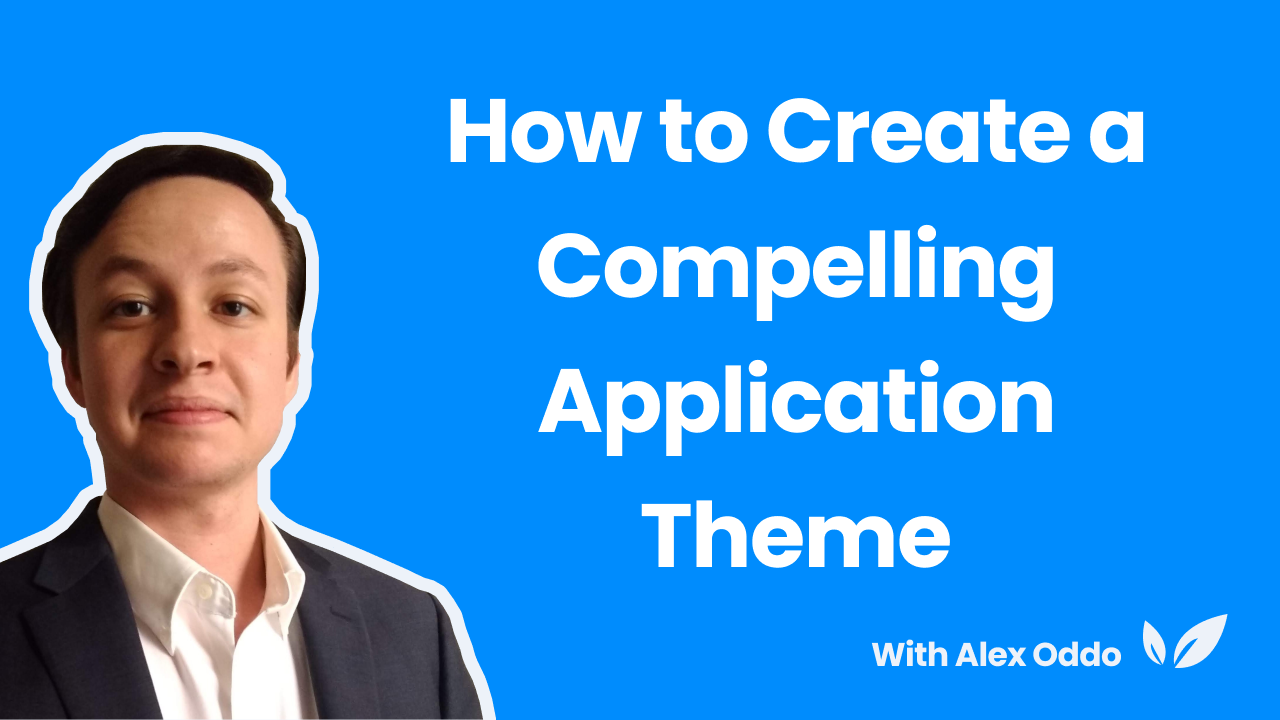
How to Create a Compelling Application Theme

How to Get into Georgetown
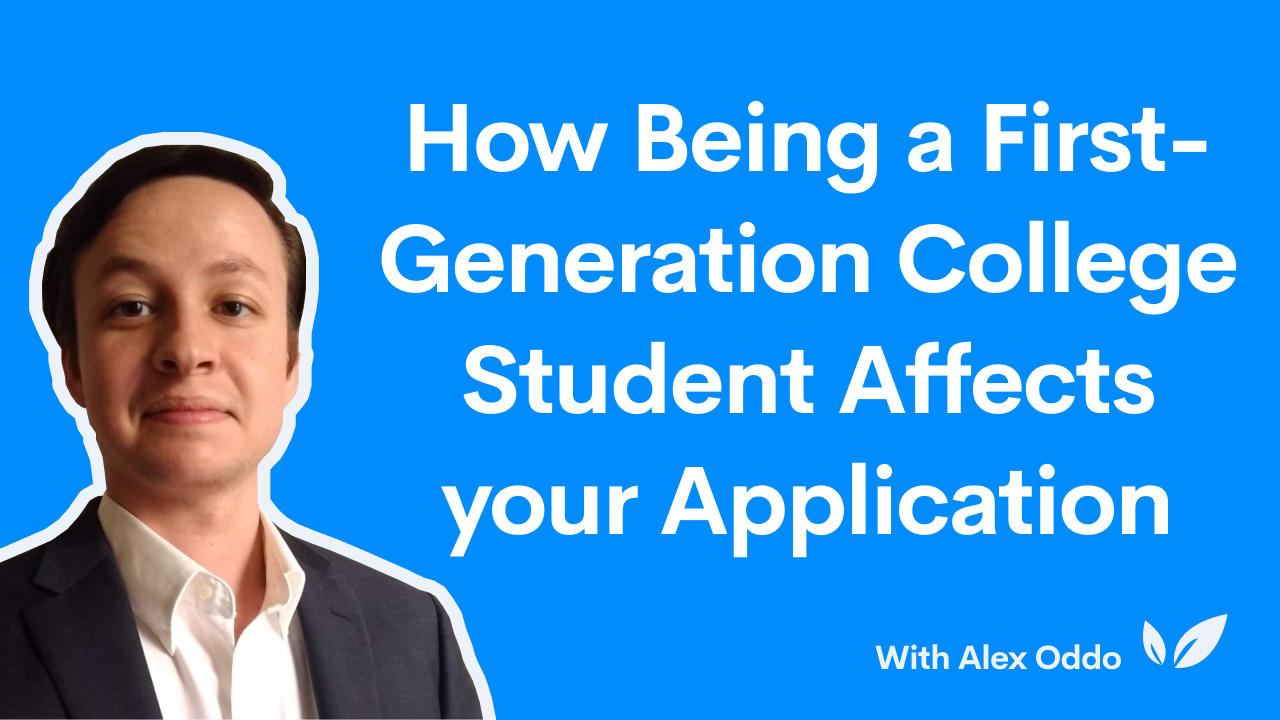
How Being a First-Generation College Student Affects your Application

Summer Schools Abroad: Beyond Borders

Why look at liberal arts colleges?

What every junior should be doing NOW to prepare for college applications

How Admissions Officers Evaluate Your Application
Popular recent recordings

How to Get Into Tech Without a Degree
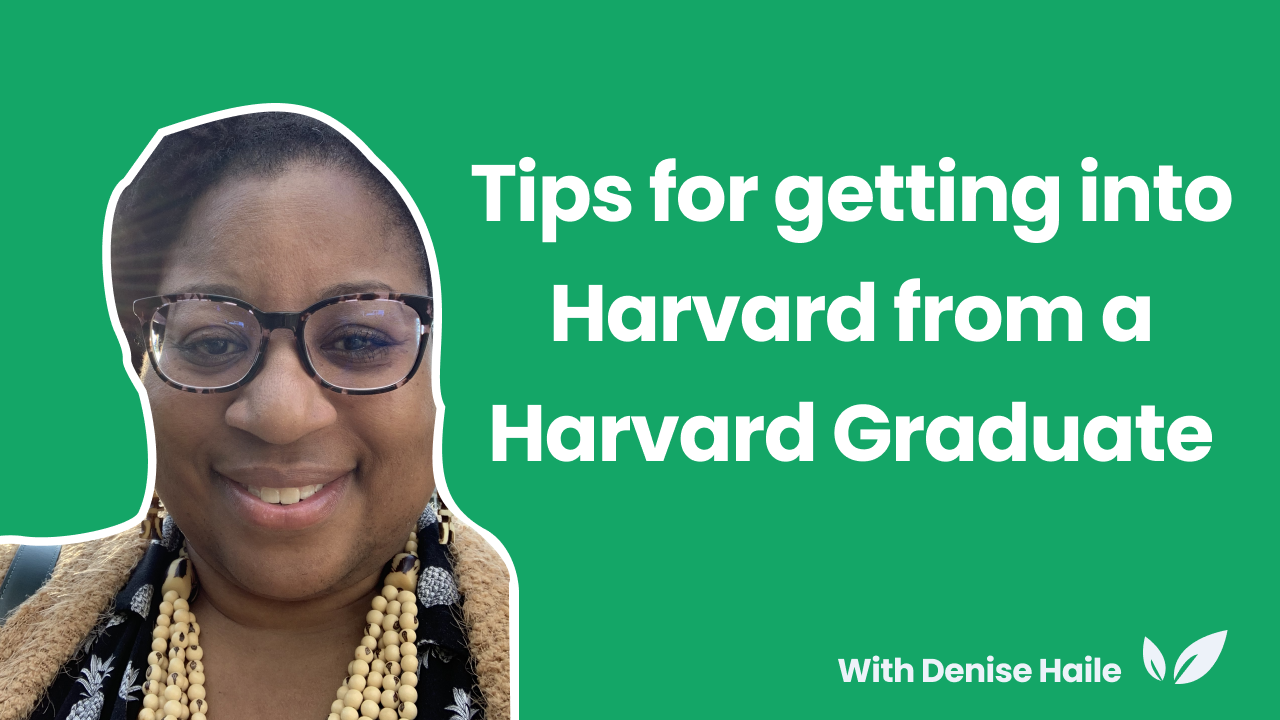
Tips for Getting into Harvard from a Harvard Graduate
Getting Started: How to Build your Narrative

Your Application in Today’s Environment

Choose Your Test
Sat / act prep online guides and tips, 3 top tips for writing exceptional georgetown essays.
College Essays
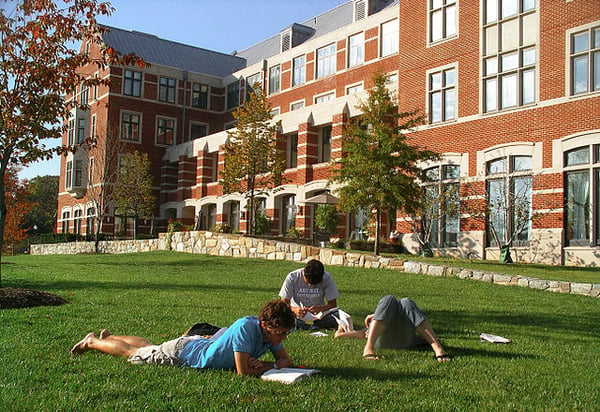
With an acceptance rate of less than 12 percent , Georgetown is ranked as an extremely competitive school . If you want to be a part of the student body, you need to impress, and one of the best opportunities you have to do that is in your Georgetown essays.
Don't let the Georgetown essay prompts intimidate you. Though they may look complicated at first—and they do ask complex questions—some foresight and planning will help you write essays that are sure to impress.
This guide will walk you through the Georgetown essays, giving you a look into the expectations and thought process behind each of the essay prompts .
Feature Image: Patrickneil /Wikimedia Commons
What Should You Know About the Georgetown Essay Prompts?
Georgetown doesn't use the Common or Coalition Application . Instead, you'll be filling out an application tailored specifically to their desires, though it may cover most of the same information.
Because of that, you'll want to pay extra close attention to what you discuss in your essays. Your essays should be tied specifically to Georgetown rather than the more general approach of the Coalition or Common Application .
The Georgetown essays include one short essay of about a half-page, single-spaced, one longer one-page essay required of all students, and a second one-page essay specifically tied to one of Georgetown's four schools: Georgetown College, the School of Nursing and Health Studies, Walsh School of Foreign Service, and the McDonough School of Business.
Students in the arts—specifically music, dance, theater, and studio art—may submit additional portfolios as part of their application, but it isn't required.

What Are the Required Georgetown Essay Prompts?
Because Georgetown's application is only for Georgetown, you'll immediately notice that they're a lot more specific than the Common or Coalition prompts. You should keep that specificity in mind as you answer the questions, thinking not just about why you want to go to a good school, but why you want to attend Georgetown specifically .
How to Answer the Georgetown Short Essay Prompt
Discuss the significance to you of the school or summer activity in which you have been most involved. (One half-page, single spaced.)
This question is pretty straightforward. Though you've no doubt discussed your extracurriculars throughout your application, this question asks you to think deeper about one of them . Ask yourself why you do those activities, and what they personally mean to you.
"Why," not "what," should be the question you're answering . Flesh out your mentions of extracurriculars in your application with discussions of why you do them and what you've learned. The activity you discuss should be significant to you—not something you do purely for fun or something you do because your parents make you.
As with the first question, don't inflate things to look more impressive. If you spent most of your summer watching TV, that might be relevant if you're an aspiring screenwriter, and you can mention it—but again, answer the question of why . Why did you choose the shows you did? What did you learn from them?
That said, watching TV isn't the best choice. You'd be better off discussing how you spent your summer working on an original short film or participating in a workshop for aspiring screenwriters—but no matter what your preferred activity, there is a way to discuss why it's significant to you and what you learned from it.
This prompt gives you space to discuss your interests, particularly the things that can't be represented by numbers as grades and test scores can. It gives Georgetown a clearer picture of you, which helps in their decision.
This is also a space to expand on participation. Maybe you never became captain of the swim team and you've been worried that the lack of leadership might count against you. In this essay, you can explain that though that was your goal, you didn't quite make it—but that you learned a lot anyway.
This essay really is about what's significant to you, so there are no wrong answers—it's your execution that matters . Avoid being too general, or focusing too much on picking the most impressive thing from your roster if that thing didn't actually matter to you. Be genuine with what's significant to you and your essay will be stronger for it.

How to Answer the Georgetown Essay Prompt for All Applicants
As Georgetown is a diverse community, the Admissions Committee would like to know more about you in your own words. Please submit a brief essay, either personal or creative, which you feel best describes you. (One page, single-spaced.)
Notice how the emphasis on this question is on you. This is called a "Why You?" style essay — though the application is for Georgetown, the admissions office wants to know why you'll be a good fit for the college and what you in particular will bring to the student body .
What this means is that Georgetown doesn't want to hear about how they have the best program or the greatest campus. They want to know about you and what makes you unique .
When answering this question, think about what makes you a good fit for Georgetown's student body. Consider their mission statement , their origin as a Catholic and Jesuit college , and what that means today.
That doesn't mean that you need to identify yourself as Catholic if you aren't (please don't do that), but that you should consider the role that faith plays in Georgetown's approach to education . How does their mission statement connect to your own life and educational goals?
Demonstrating that you understand the school's mission and how you can contribute to it as a student is one of the most important parts of this question.
But "Why You?" is only part of the question . The specific mention of diversity is important, too. Its inclusion in the question means that it's important to Georgetown, and they want you to demonstrate that it's important to you, too.
Don't get too fixated on typical meanings of "diverse." We often use the word to refer to the variety of genders, sexualities, races, socio-economic statuses, and so on that exist in the world, but diversity of thought is worthwhile, too. Of course, you should write about your gender, sexuality, race, and so on if it's relevant to what you'll bring to campus—and it often is—but don't feel like it's all you have to offer.
Think about what your experience has taught you, and how those lessons will contribute to Georgetown's diverse student body. That can mean discussing overcoming socio-economic hardship, or it can mean relating how you and your seven brothers used to squabble until you realized working together got chores done faster. Everybody has a unique story to tell, and this is Georgetown offering you space to tell yours .
Georgetown invites you to get creative here, but if you want to take a more embellished approach than a traditional essay, be sure that that creativity comes through in your writing and language rather than in the events . Don't inflate things to look more interesting or diverse than you are—this is your chance to flesh out the grades and test scores with your personality, so be sure it's your personality that the admissions office sees.
How to Answer the Georgetown College Essay Prompt
Georgetown College is the largest undergraduate school at Georgetown University, and contains many of the school's arts and sciences programs.
What does it mean to you to be educated? How might Georgetown College help you achieve this aim? (Applicants to the Sciences and Mathematics or the Faculty of Languages and Linguistics should address their chosen course of study.) (One page, single-spaced.)
This question is asking about your personal relationship with education and learning. But more than that, it's asking you why you want to attend Georgetown, making it a "Why Us?" essay .
When answering this prompt, think about your goals and how Georgetown fits into them . They don't need to hear about how they're a good school and you've always wanted to attend a competitive college—they already know that, and most other students also want to attend a good school. Why Georgetown specifically, as opposed to all the other possible schools you could apply to?
This is a good place to demonstrate familiarity with their mission and curriculum. Are there particular classes or faculty driving your decision to attend? Mention them!
Think holistically here. How will attending Georgetown enrich your education and help you reach your career goals? Keep their mission statement in mind as you write—consider the ideas of diversity, service to humanity, and community and how those fit into your goals.
Again, avoid generalities. Your essay should have enough concrete connection to Georgetown that you couldn't easily swap another school's name in and still have it make sense. Of course, there will always be some overlap with other schools, but be sure that the true spirit of Georgetown comes through in your essay.

How to Answer the Georgetown School of Nursing & Health Studies Essay Prompt
Georgetown's School of Nursing and Health Studies is exactly what it sounds like. This is where you'll be applying if you're interested in any of the health care fields, which is reflected in the prompt.
Describe the factors that have influenced your interest in studying health care. Please specifically address your intended major (Global Health, Health Care Management & Policy, Human Science, or Nursing). (One page, single-spaced.)
This question isn't quite a clear-cut "Why Us?" or "Why You?" question, unlike the previous ones. Instead, it's asking "Why Health Care?"
Again, always keep in mind Georgetown's mission as a college: diversity, discussion, and the well-being of humanity. All of these things can factor into your essay in a meaningful way.
Think beyond health care being a reliable and well-paying field. Why do you want to care for people? Why the health field, specifically? Tying Georgetown's mission into this question is a great way to demonstrate your interest in the field, but also in the specific ways that this school teaches.
In this question, Georgetown wants you to demonstrate your interest in the field. If you're invested in health care, you're more likely to succeed in the program. The admissions office also wants to know what passion and interest you'll bring to the school, making you a student they want to invest in.
If you don't already know why you've chosen to pursue health care over other fields, now's the time to start thinking about it. Health care can often be thankless, difficult, and even frightening if you're working in emergency situations. What drives you to do it anyway?
Maybe you've struggled with illness yourself, and you want to commit to researching cures. Or maybe you're fascinated by the ways that disease impacts society, and you want to learn more about prevention and how to enact it on an individual basis. No matter what your career goal is, it's important that you can explain why you've chosen this field over all others.
However, be sure you can tie your interest to Georgetown specifically. Your essay will be even stronger if it explains not just what appeals to you about health care, but why Georgetown is the right college to help you achieve your goals.
How to Answer the Walsh School of Foreign Service Essay Prompt
If you're interested in international relations, Wash School of Foreign Service is likely where you'll be applying.
The Walsh School of Foreign Service was founded more than a century ago to prepare generations of leaders to solve global problems. What is motivating you to dedicate your undergraduate studies to a future in service to the world? (One page, single-spaced.)
This is a perfect example of a "Why Us?" question. Of all the schools out there, and all the programs, what led you to apply to Georgetown's school of foreign service?
The trick to this question is being specific. Sure, the Walsh School of Foreign Service has interesting classes, great professors, and a strong track record for job placements, but so do a lot of other schools out there. What does it offer that other schools can't? In your response, be sure to mention specific courses/internship opportunities/professors who will give you opportunities unique to Georgetown.
We give more advice on how to answer this question under the next prompt, which is also a Why Us question!

How to Answer the McDonough School of Business Essay Prompt
The McDonough School of Business is exactly what it sounds like. If you're attending Georgetown with an interest in business, you'll need to answer the following prompt:
The McDonough School of Business is a national and global leader in providing graduates with essential ethical, analytical, financial and global perspectives. Please discuss your motivations for studying business at Georgetown. (One page, single-spaced.)
Like the Walsh School of Foreign Service, the McDonough School of Business prompt is a classic "Why Us?" question , asking you to identify not just that Georgetown is a good school, but why it's the right school for you and your interests.
To answer this question, consider the university's ethos and curriculum. Look at their course offerings and consider those as well as whatever reasons you have for applying. Think specifically, not generally— beyond it being a well-respected university, what does Georgetown have to offer you that other well-respected universities do not?
Georgetown wants to hear that you're committed to their program specifically, so answer in specifics. Identify features of their program in particular, and be sure to answer the question of why those features draw you to Georgetown.
If you have a personal anecdote about Georgetown, such as a moment on a tour, a personal connection to the campus, or admiration for a particular alumni, this essay is a good place to discuss it. If not, it's always a good idea to use concrete specifics, such as classes and extracurriculars that appeal to you. Fold those into a discussion of Georgetown's mission and your own career goals to paint a complete picture of why this is the right school for you.

What Does a Successful Georgetown Essay Look Like?
Planning an essay can be difficult as you try to weigh what the school might want against everything you could possibly cover. Thankfully, there's at least one successful Georgetown essay out there you can read in its entirety :
"Listen, girl. He's over 60 and speaks no English. There is no way we would hire him." His tone was rude, but I sadly understood why my dad wasn't hired. I faced my hopeful dad and watched his smile drop as I told him that Dave just remembered that they hired someone yesterday and that they really couldn't afford to hire anyone else. My dad was disappointed, but nonetheless he graciously shook Dave's hand and thanked him for his time. Job searching is difficult for everyone, but in a world full of Daves, it's almost impossible. Daves are people who look at my family and immediately think less of us. They think illegal, poor and uneducated. Daves never allow my dad to pass the first round of job applications. Daves watch like hawks as my brother and I enter stores. Daves inconsiderately correct my mother's grammar. Because there are Daves in the world, I have become a protector for my family. I excuse their behavior as just being a "typical American." I convince my mother that they are only staring at her lovely new purse. I convince my dad they are only shouting about store sales to us. Aside from being a protector, I am also an advocate. As an advocate, I make sure my family is never taken advantage of. I am always looking out for scams and discrepancies. I am the one asking the questions when we buy or sell a car. I make sure all details are discussed and no specifics are left unanswered.
It's not hard to see why the writer was accepted to Georgetown. This essay clearly demonstrates her experience and understanding of the world. The last paragraph is a great example of how to turn that experience into something actionable—she wants to go into public service, politics, or diplomacy because of how she's helped her parents and the bigotry she's witnessed as she's done so.
We know from reading exactly what the writer will bring to Georgetown: an understanding of the world and the way it's treated her and her family. She demonstrates her understanding of diversity clearly, which answers the first prompt—it shows what makes her unique as well as what she'll contribute.
The essay shows her personal story and how that's influenced her lifelong plans. Because the admissions office understands where she comes from and the essay finishes with where she hopes to go—as well as covering some of the obstacles she's overcome—they have a complete picture of her as a student.
One area the essay could be improved is strengthening the connection to Georgetown specifically. This essay is quite strong—she did get into Georgetown with it—but spending a little more time reflecting on how her life experience connects to Georgetown's mission would give it a little extra oomph . As it is, this could be an application essay for pretty much any school. Drawing a clear connection from your experiences to the college you're applying to demonstrates a stronger degree of interest, making your essay stand out.

Key Points of Advice for Georgetown Essays
No matter which prompts you're answering, it's a good idea to follow general advice for your Georgetown essays, too. Though the application for Georgetown is unique to the school, it still follows most of the common rules of college applications, so be sure to read up on some common tips for college applications .
#1: Read Prompts Carefully
Don't just answer the surface-level question. You have quite a bit of space to answer each of these, so read each one carefully, understand the deeper questions it might be asking, such as "Why You?" and be sure to answer those as well. Brainstorming will be a huge help here, as you can get all of your ideas out and select the ones that support your point the best.
#2: Connect Your Story to Your School
When you're writing "Why Us?" essays, think about your story—the things that have made you who you are, your ambition, your goals—and add in how Georgetown is the next step on your journey. Think beyond that it has a good reputation or that lots of impressive people have graduated from there. Draw a clear line between you and Georgetown by tying your experience in with its curriculum and mission statement. This will demonstrate that you're not just reusing the same essay for a bunch of schools, and that Georgetown is your real goal.
#3: Edit and Revise
Editing and revision are your best friends when it comes to a polished Georgetown essay. Don't just fire off a draft and call it good. Spend some time planning, writing, editing, and revising , being sure to start early so you can let your drafts rest between readings.
Spending more time will take some of the stress out of writing and let you put in more effort to get it into shape. The longer you have, the more thought you can put into it, so start early!
What's Next?
Give yourself plenty of time to get your Georgetown essay done by staying on top of all the deadlines for your application .
What else do you need to get into your dream school aside from stellar essays? This guide has all the requirements to get into Georgetown .
Even if you're not going to Georgetown, you should understand the college application process from start to finish. This helpful guide will walk you through applying to college starting from your freshman year of high school!

Melissa Brinks graduated from the University of Washington in 2014 with a Bachelor's in English with a creative writing emphasis. She has spent several years tutoring K-12 students in many subjects, including in SAT prep, to help them prepare for their college education.
Ask a Question Below
Have any questions about this article or other topics? Ask below and we'll reply!
Improve With Our Famous Guides
- For All Students
The 5 Strategies You Must Be Using to Improve 160+ SAT Points
How to Get a Perfect 1600, by a Perfect Scorer
Series: How to Get 800 on Each SAT Section:
Score 800 on SAT Math
Score 800 on SAT Reading
Score 800 on SAT Writing
Series: How to Get to 600 on Each SAT Section:
Score 600 on SAT Math
Score 600 on SAT Reading
Score 600 on SAT Writing
Free Complete Official SAT Practice Tests
What SAT Target Score Should You Be Aiming For?
15 Strategies to Improve Your SAT Essay
The 5 Strategies You Must Be Using to Improve 4+ ACT Points
How to Get a Perfect 36 ACT, by a Perfect Scorer
Series: How to Get 36 on Each ACT Section:
36 on ACT English
36 on ACT Math
36 on ACT Reading
36 on ACT Science
Series: How to Get to 24 on Each ACT Section:
24 on ACT English
24 on ACT Math
24 on ACT Reading
24 on ACT Science
What ACT target score should you be aiming for?
ACT Vocabulary You Must Know
ACT Writing: 15 Tips to Raise Your Essay Score
How to Get Into Harvard and the Ivy League
How to Get a Perfect 4.0 GPA
How to Write an Amazing College Essay
What Exactly Are Colleges Looking For?
Is the ACT easier than the SAT? A Comprehensive Guide
Should you retake your SAT or ACT?
When should you take the SAT or ACT?
Stay Informed
Get the latest articles and test prep tips!
Looking for Graduate School Test Prep?
Check out our top-rated graduate blogs here:
GRE Online Prep Blog
GMAT Online Prep Blog
TOEFL Online Prep Blog
Holly R. "I am absolutely overjoyed and cannot thank you enough for helping me!”

Sample Essays
The breadth of Georgetown’s core curriculum means that students are required to write for a wide variety of academic disciplines. Below, we provide some student samples that exhibit the key features the most popular genres. When reading through these essays, we recommend paying attention to their
1. Structure (How many paragraphs are there? Does the author use headers?)
2. Argument (Is the author pointing out a problem, and/or proposing a solution?)
3. Content (Does the argument principally rely on facts, theory, or logic?) and
4. Style (Does the writer use first person? What is the relationship with the audience?)
Philosophy Paper
- Singer on the Moral Status of Animals
Theology Paper
- Problem of God
- Jewish Civilization
- Sacred Space and Time
- Phenolphthalein in Alkaline Solution
History Paper
- World History
Literature Review
Comparative Analysis
Policy Brief
- Vaccine Manufacturing
White Paper
Critical Analysis
- Ignatius Seminar
Are you seeking one-on-one college counseling and/or essay support? Limited spots are now available. Click here to learn more.
Georgetown Supplemental Essays 2023-24 – Prompts and Advice
September 11, 2023
The nation’s oldest Jesuit institution of higher learning is also its most selective, as Georgetown University welcomed just 13% of applicants to the Class of 2027 onto its historical and notably beautiful Washington, D.C. campus. Whenever you are applying to a school of Georgetown’s caliber, where the average admitted applicant has a 1470 SAT score and is at (or near) the top of their high school class, you need to find ways to set yourself apart from the pack. Toward that aim, prospective Hoyas need to take advantage of the Georgetown supplemental essays.
(Want to learn more about How to Get Into Georgetown? Visit our blog entitled: How to Get Into Georgetown: Admissions Data and Strategies for all of the most recent admissions data as well as tips for gaining acceptance.)
The goal is to write compelling, standout compositions. Your essays should showcase your exceptional writing ability and reveal more about who you are as an individual. Below are Georgetown’s essay prompts for the 2023-24 admissions cycle along with tips about how to address each one.
Georgetown Supplemental Essays – Prompt 1
Indicate any special talents or skills you possess. (250 words)
If you are a world-class athlete, you are likely already in the recruitment process. If you placed high in AIME or won a National Merit Scholarship, that is already stated in the awards section. Therefore, using the prized 250 words of real estate to merely rehash the fact that you won an award for something you are good at would not be an inspiring move. Instead, use this essay as an opportunity to offer a new level of depth and understanding about your talent(s). In addition to discussing the talent you possess, touch on the journey of how you developed your abilities.
A few years back, Malcolm Gladwell popularized the idea that becoming an expert at anything takes 10,000 hours of practice. Consider talking about the grind and sacrifice it took you to become great at a given skill. Describe how you see that skill becoming even more finely-tuned/developed over time. If this skill fits into your future academic/career plans, all the better—share that too!
Georgetown Supplemental Essays – Prompt 2
Briefly discuss the significance to you of the school or summer activity in which you have been most involved. (approximately 1/2 page, single-spaced)
Perhaps you are the captain of a team, the editor-in-chief of your school paper, or the president of a club. On the other hand, you may simply be a valuable contributing member. Regardless of whether you are a leading man/woman or a still-essential bit player, make sure that you use your writing ability to show the admissions officer what type of involved team member you are rather than merely telling them.
You can also discuss how you have engaged with your high school local/community. Share what you have learned from interacting with people of a different ethnicity, religion, gender, sexual identity, etc. Draw on past evidence of your commitment to being a positive force in the context of your activity/activities. Also be sure to speculate how that is likely to manifest on Georgetown’s campus. Research and cite Hoya student-run organizations, local nonprofit groups, or anything else you are drawn to. The admissions committee wants to understand precisely how you will contribute to their campus community of 7,000+ undergrads. Drawing the link between your past efforts and future aims is critical here. For example, if you’ve done work with Habitat for Humanity throughout your teens, it will be most impactful if you express your commitment to joining Georgetown’s chapter of Habitat for Humanity in the future.
Georgetown University Supplemental Essays – Prompt 3
As Georgetown is a diverse community, the Admissions Committee would like to know more about you in your own words. Please submit a brief essay, either personal or creative, which you feel best describes you. (approximately 1 page, single-spaced)
Whether you decide to write about yourself in a way that is light, creative, humorous, personal, sincere, or vulnerable (any are perfectly fine), aim to reveal a picture of yourself that cannot be gleaned from elsewhere in your application materials.
Take note of the wide-open nature of this prompt. While there are no limits to the way in which you approach this essay, here are some angles to consider:
- A perspective you hold
- An experience you had
- A community you belong to
- Your cultural or family background
- Something you’ve had to overcome
The admissions officer looking at your essay is hoping to connect with you through your written words. So be open, humble, thoughtful, inquisitive, emotionally honest, mature, and insightful. No matter what type of story you tell, the goal is to have the reader come away saying, “I can definitely see this applicant as a contributing member of our talented and engaged student community.”
Georgetown Supplemental Essays — The School-Specific Essay
Depending on the College or School that you are applying to at Georgetown, you’ll need to write a separate school-specific essay. At their core, all of them are “Why Us” essays, so as you address each prompt (see below), be sure to include Georgetown-specific offerings and opportunities that support your reasoning, interests, and future plans.
Elements of a great Georgetown “Why Us?” essay
- Cite school-specific academic programs , professors, research opportunities , internship/externship programs , and study abroad programs .
- Reference student-run organizations at Georgetown that align with your passions.
- Describe how you take advantage of Georgetown’s immense resources both inside and outside of the classroom.
- Make sure to touch on both a) why Georgetown is the perfect fit for you and) why you are the perfect fit for Georgetown. Covering both topics is essential.
Common mistakes on a Georgetown “Why Us?” essay .
- Fawning over the picturesque Gothic-style Georgetown campus (it is quite beautiful, but they already know that).
- Georgetown is top-ranked, prestigious, and has a great reputation. Again, they know!
- Too many generic expressions of feeling (e.g., It has been my dream since I was a toddler to be a Hoya…).
- Recycled statements from your other “Why Us?” essays that come across as stale, impersonal, or worst of all–irrelevant/inaccurate.
Georgetown College: A liberal arts education from the College of Arts & Sciences involves encounters with new concepts and modes of inquiry. Describe something (a class, a book, an event, etc.) that changed your thinking. (Applicants to the sciences, mathematics, public policy or languages are encouraged to include examples related to that field.).
Since you’ll be encountering all kinds of new topics and ways of thinking at Georgetown, the admissions committee is interested in discovering how you’ve interacted with new and surprising information in the past. Keep in mind that the ways in which your thinking changed are much more important than the class, book, or event you select, so choose something that allows you to demonstrate your open-mindedness, curiosity, and willingness to challenge yourself—this might be a book you read in English class, a lecture you attended, a summer course you engaged in, etc. Note that Georgetown encourages certain types of applicants to choose examples related to their prospective field of study.
Further, be sure to describe why you are interested in a liberal arts education from Georgetown specifically.
Georgetown Supplemental Essays (Continued)
School of nursing & health studies: describe the factors that have influenced your interest in studying health care. please specifically address your intended major (global health, health care management & policy, human science, or nursing)..
“A nurse is not what you do, it is who you are.”
This quote from an anonymous source captures the idea that becoming a nurse is a calling; not a profession you just stumble into. Healthcare in general is no different. Healthcare professionals are willing to work long shifts in the service of others, be on the frontlines of a pandemic, and deal with life’s toughest challenges (e.g., suffering and death) on a regular basis. Many applicants share stories of caring for sick relatives, experiencing a tough medical episode themselves, or observing the challenges faced by a particular community as inspiration for studying nursing or healthcare. In addition to your school-specific research, this essay is a chance to show the admissions committee that you are a passionate and mature healthcare or nursing candidate and that this field is genuinely “who you are.”
Walsh School of Foreign Service: The Walsh School of Foreign Service was founded more than a century ago to prepare generations of leaders to solve global problems. What is motivating you to dedicate your undergraduate studies to a future in service to the world?
International service is not something every 17/18-year-old in the country is dreaming about doing as a vocation. There is likely a very interesting story surrounding what motivated you to apply to the Walsh School of Foreign Service and this essay invites you to share this very narrative. You don’t need to look any deeper than today’s headlines to identify powerful and immensely challenging global problems. Whether you are aiming for a B.S. in Business and Global Affairs, a B.S. in Foreign Service, or a B.S. in Global, International, and Comparative History, you likely have a highly specific set of academic and career goals taking shape in your mind.
If you can communicate these goals and the motivations behind them while sharing a vision for how you will contribute to the betterment of humankind in one or multiple regions of the world, then you are likely to end up with an excellent Walsh essay. Moreover, you’ll want to be sure to discuss why Walsh in particular will be a great fit for you.
McDonough School of Business: The McDonough School of Business is a national and global leader in providing graduates with essential ethical, analytical, financial and global perspectives. Please discuss your motivations for studying business at Georgetown.
Before you start writing, you’ll want to do some McDonough-specific research and think about why a business education from McDonough in particular will be a great fit for your interests and goals. Further, to stand out, applicants need to connect the resources they’ve chosen to experiences they’ve had, demonstrating that they have availed themselves of every opportunity to dive into the business world during their high school years. Of course, not everyone has parents who hand them money to invest in the stock market or land them an internship at Goldman Sachs in 9th grade.
Relevant experiences can include high school investing clubs, participation in activities like FBLA, summer programs/courses in business/finance/economics, running your own local small business or e-business (Etsy, landscaping, etc.), or just a regular old retail job. The important thing to highlight is what you learned from your experiences, how you’ll bring that newly acquired knowledge to the classroom at Georgetown, and how your experiences have informed & influenced what you hope to continue learning in college.
How important are the Georgetown supplemental essays?
There are a whopping 8 factors that Georgetown considers to be “very important” to the evaluation process. These are: rigor of secondary school record, character/personal qualities, class rank, GPA, standardized test scores, recommendations, extracurricular activities, and most relevant to this blog—the application essays. The essays undoubtedly play a significant role in the admissions process at Georgetown. They can help the committee decide who to admit when choosing between similarly-credentialed (GPA, test scores, etc.) applicants.
Want personalized assistance with your Georgetown supplemental essays?
Interested in working with one of our experienced and knowledgeable essay coaches as you craft your Georgetown supplemental essays? We encourage you to get a quote today.
- College Essay
Andrew Belasco
A licensed counselor and published researcher, Andrew's experience in the field of college admissions and transition spans two decades. He has previously served as a high school counselor, consultant and author for Kaplan Test Prep, and advisor to U.S. Congress, reporting on issues related to college admissions and financial aid.
- 2-Year Colleges
- Application Strategies
- Best Colleges by Major
- Best Colleges by State
- Big Picture
- Career & Personality Assessment
- College Search/Knowledge
- College Success
- Costs & Financial Aid
- Data Visualizations
- Dental School Admissions
- Extracurricular Activities
- Graduate School Admissions
- High School Success
- High Schools
- Law School Admissions
- Medical School Admissions
- Navigating the Admissions Process
- Online Learning
- Private High School Spotlight
- Summer Program Spotlight
- Summer Programs
- Teacher Tools
- Test Prep Provider Spotlight
“Innovative and invaluable…use this book as your college lifeline.”
— Lynn O'Shaughnessy
Nationally Recognized College Expert
College Planning in Your Inbox
Join our information-packed monthly newsletter.

Undergraduate Admissions

Georgetown University admits qualified students of any age, sex, sexual orientation, gender identity, race, color, disability status, religion, citizenship, immigration status, and national and ethnic origin to all the rights, privileges, programs, and activities generally accorded or made available to students at the school. It does not discriminate on the basis of age, sex, sexual orientation, gender identity, race, disability status, color, religion, citizenship, immigration status, or national and ethnic origin in administration of its educational policies, admission policies, scholarship and loan programs, and athletic and other school administered programs.
- High School Preparation
- Standardized Tests
- Application Procedure
- Early Action
- Campus Visits
- Deferred Enrollment
- Transfer Students
- Transfer Undergraduate School within the University
- International Students
- Visiting Student Program
- Immunization Requirements
1. High School Preparation
While the Committee on Admissions is most interested in the quality of a student’s work, general promise, and seriousness of purpose, it is recommended that secondary school preparation include four years of English, a minimum of two years of social studies, modern language, and mathematics and one year of natural science. Students who plan a concentration in mathematics or science should include four years of mathematics and at least three years of science. Candidates for the majors in the School of Nursing and the School of Health should include at least three years of mathematics and must include one year each of biology and chemistry. Students interested in the McDonough School of Business should complete a minimum of three years of mathematics, through advanced algebra and trigonometry, as calculus is required of all students in the program. Two years of natural science are recommended. Students interested in the Faculty of Languages and Linguistics or the Walsh School of Foreign Service are recommended to have a background in a modern foreign language or Latin.
[ back to top ]
2. Standardized Tests
All applicants are required to take the SAT or the ACT. Both tests are acceptable, and on neither test will a Writing component be utilized in admissions decisions. All tests should be taken by January of the senior year in order to allow time for the results to reach Georgetown by early February. We continue to recommend that students who have A.P. (Advanced Placement) scores submit them to supplement their admissions file.
The University requires that all scores from standardized tests be submitted directly from the testing agency; please indicate Georgetown’s code number when requesting score reports (SAT code 5244; ACT code 0668).
It is important to note that, while objective test results provide important information about candidates, the Committee on Admissions is far more concerned with school record, academic program, and rank in class than with test scores. There are no cut-off scores.

3. Application Procedure
All first-year student applications are due in the Office of Undergraduate Admissions by November 1 for Early Action and January 10 for Regular Decision. These applications should contain the results of three and one half years of high school work. A complete application should include:
- Georgetown Application for First-Year Admission
- Georgetown Application Supplement
- Secondary School Report (including transcript and counselor recommendation)
- Teacher Recommendation
- Nonrefundable Application Fee
- Results of the SAT examination or the ACT sent directly from the testing service
- No application will be considered until all of the above credentials have been received. A notice of missing credentials will be sent via e-mail, but students should make every effort to ensure credentials are submitted on time.
- Students seeking financial assistance should submit a copy of the Free Application for Federal Student Aid (FAFSA) and the CSS PROFILE (administered by the College Board). Financial need is considered separately from the application for admission.
4. Early Action
The Early Action program is designed to enable superior students to learn of their admission early in their senior year. Students offered admission at Early Action are those whom the Admissions Committee members feel confident would be admitted at Regular Decision. Georgetown’s Early Action program is grounded in the belief that students should be free to choose among colleges until the Candidates Reply Date, May 1. Accordingly, accepted students will have the same reply date (May 1) as all candidates.
In keeping with this principle, students applying under the Early Action program may not apply at the same time to binding Early Decision programs since they would not be free to choose Georgetown if admitted. Students are welcome to apply to other Early Action programs or other Regular Decision programs while at the same time applying to Georgetown’s Early Action program. No candidates are denied admission during the Early Action review. Candidates not accepted under the Early Action program are deferred to the regular review. Deferred Early Action candidates are given the same full and fair consideration as Regular Decision candidates.
Applicants for Early Action must indicate their interest in being considered for this program in the space provided on the application form. The admissions application and all credentials for Early Action must be received at Georgetown by November 1. Please note that the Early Action review is based on information from first, sophomore, and junior years, so it is not necessary to rush SAT Subject Test results to the Office of Undergraduate Admissions. Fall scores will be added to an applicant’s file if the student is deferred to the Regular Decision review. Early Action decisions will be announced December 15.
5. Campus Visits
Students interested in Georgetown are encouraged to visit the University. A campus visit will provide prospective students with a clearer understanding of Georgetown’s educational programs, environment, and social setting.
Information sessions, conducted by members of the Admissions staff, offer prospective students and their parents an opportunity to learn more about the academic programs and student life at Georgetown, as well as the admissions process and procedures. Information sessions and tours are held on weekdays and Saturday mornings throughout the year on a variable schedule. Please contact the Office of Undergraduate Admissions at (202) 687-3600.
6. Interviews
Another important part of the selection process at Georgetown is an interview with a member of an Alumni Admissions Program committee which are located in all fifty states and in many foreign countries. As applications are received by the Office of Undergraduate Admissions, each student who lives or attends boarding school within a committee’s jurisdiction is provided with the name of an alumni interviewer and asked to make arrangements for an interview. This interview provides candidates an opportunity to highlight particular aspects of their background and achievements which they would like to call to the attention of the Admissions Committee, as well as to learn more about the University from the point of view of the local alumnus.
7. Deferred Enrollment
Georgetown has a policy of allowing admitted first-year students to defer their enrollment until the following year. Further details can be obtained from the Office of Undergraduate Admissions . Transfer students may not defer admission.
8. Transfer Students
Georgetown welcomes transfer applications to its undergraduate programs. Transfer applicants should have completed one full-time semester of at least twelve transferable credits, or the equivalent, on the college level; otherwise they should follow the first-year student application procedure. Students who have already earned a bachelor’s degree at another college or university are not eligible for admission to Georgetown’s undergraduate degree programs. Students who have an undergraduate degree are welcome, however, to apply to take courses at the undergraduate level as a special non-degree student either through the School of Continuing Studies or one of the five undergraduate schools according to the relevant policies of the school.
Transfer students admitted for the fall term, may begin studies during the summer term if they wish. Credit toward Georgetown degrees may be given for work done at other accredited institutions subject to the following limitations:
- Credit for required courses will be given if the course is similar to the one required at Georgetown.
- Credit for electives will be given if the course is similar to courses offered at Georgetown. Credit for courses not offered at Georgetown will be considered on an individual basis.
- Grades earned must be at least one level above minimum passing level, e.g., C. Passing grades on a Pass/Fail system are acceptable if defined as C or better.
- The maximum number of transferable credits is one-half of the total required for the degree. Students must spend a minimum of four full semesters in residence at Georgetown to earn a degree. Summer sessions will not count toward fulfilling the residency requirement. Work completed on semester study abroad will not count toward fulfilling the academic residency requirement unless completed at one of Georgetown’s Global Living and Learning Communities or at SFS-Qatar. These programs count toward academic residency requirements.
An evaluation of courses accepted for transfer will be sent with or shortly after the notification of acceptance. The following materials should be submitted no later than March 1:
- Georgetown Transfer Application
- Georgetown Transfer Application Supplement
- Secondary School Report, to include high school transcript
- SAT/ACT results (Waived only for applicants who graduated from high school five or more years prior to intended matriculation at Georgetown)
- Official college transcripts from current institution and any previously attended institution(s)
- A list of the courses planned for the term(s) not included in the current transcript
- Dean’s Report from current college/university
- Professor’s Report from a professor preferably in major area of study
Applications will be reviewed as soon as possible after these materials have been received and admissions decisions will be sent June 1. In some cases it will be necessary to wait for the final transcript before a decision can be reached. Students who are offered admission by June 1 will be expected to confirm their enrollment by June 15.
9. Transferring Undergraduate School within the University
Since the five undergraduate schools are distinct colleges under the jurisdiction of separate deans, a student wishing to transfer within the University must make an application in writing to the school to which he or she wishes to transfer. Each undergraduate school establishes its own admission standards for students. Students considering a change in program should consult with their undergraduate advising deans to learn about deadlines and procedures. Students who switch programs should expect to complete all of the degree requirements of the undergraduate school to which they transfer.
10. International Students
Georgetown welcomes applications for admission from well-qualified international students. Deadline dates are the same as those established for students applying from within the United States. Please note that the application fee must be in U.S. dollars.
Along with final application forms, students should submit complete, translated, and official transcripts of all secondary and, when applicable, university credentials along with subjective evaluations from teachers and tutors when obtainable. Similarly, students applying from countries offering Matriculation Examinations must submit results of such examinations as soon as results are available. These credentials will be considered for admission as well as for placement at the proper level when the application file is complete.
All candidates studying in non-U.S. educational systems whose native language is not English are required to demonstrate a level of competence that would indicate their ability for successful study in English. It is recommended that such students submit results from the Test of English as a Foreign Language (TOEFL), including the Test of Written English (TWE), given at test centers throughout the world. International applicants are required to take the Scholastic Aptitude Test (SAT) or the American College Testing Program (ACT) examination. These tests are available in virtually every foreign country, and should be taken prior to January 1 to allow the results to be sent to the Office of Undergraduate Admissions in time for review. Complete information for International Students is available from the Office of Undergraduate Admissions .
11. Visiting Student Program
Due to limitations of space, Georgetown is only able to offer admission to a limited number of students via our Visiting (non-degree) Student Program. Applications must be approved by the dean of the school in which the student wishes to study. Admission for the Visiting Student Program is for one semester.
Application forms may be obtained from the Office of Undergraduate Admissions website. Completed applications (including transcripts and application fee) must be submitted by November 15 for admission in January, and by July 15 for admission in September. No applications will be accepted after these dates. Final decisions will be made by August 10 for the fall semester and by December 20 for the spring semester.
Students who are earning degrees at schools other than Georgetown and who wish to attend Georgetown as Visiting Students must include with their application materials a letter from the current dean approving the courses to be taken at Georgetown. Such students are expected to attend full time in the school to which they are applying at Georgetown.
Approval for Visiting Student status does not mean automatic acceptance into the courses requested and approved. Enrollment in specific courses is determined on a space-available basis only. Visiting Students are ineligible for financial aid; campus housing may be available but is not guaranteed.
12. Immunization Requirements
Mandatory immunizations and health screenings are based on District of Columbia Law as well as guidance from the CDC and the American College Health Association. Requirements vary based on a student’s age, history, and course of study. Student specific requirements can be found within their account in the GU Immunization and Health Information Database Portal. Students must submit all required information and documentation electronically through this portal upon matriculation. Required immunization and testing information must be entered into the Georgetown immunization database portal, at https://georgetown.studenthealthportal.com with accompanying verification signed by a health care provider. The deadline for incoming fall semester students to enter this information is September 1 (December 15 for students entering in the spring semester). Failure to meet this deadline may result in a penalty fee and prevent students from registering for classes. If, after reviewing the immunization requirements, you or your health care provider have questions, please contact the Georgetown Student Health center through a secure message in the immunization database portal or by calling the Student Health Center immunization line at 202-687-3100.
- Search All Scholarships
- Exclusive Scholarships
- Easy Scholarships to Apply For
- No Essay Scholarships
- Scholarships for HS Juniors
- Scholarships for HS Seniors
- Scholarships for College Students
- Scholarships for Grad Students
- Scholarships for Women
- Scholarships for Black Students
- Scholarships
- Student Loans
- College Admissions
- Financial Aid
- Scholarship Winners
- Scholarship Providers
Student-centric advice and objective recommendations
Higher education has never been more confusing or expensive. Our goal is to help you navigate the very big decisions related to higher ed with objective information and expert advice. Each piece of content on the site is original, based on extensive research, and reviewed by multiple editors, including a subject matter expert. This ensures that all of our content is up-to-date, useful, accurate, and thorough.
Our reviews and recommendations are based on extensive research, testing, and feedback. We may receive commission from links on our website, but that doesn’t affect our editors’ opinions. Our marketing partners don’t review, approve or endorse our editorial content. It’s accurate to the best of our knowledge when posted. You can find a complete list of our partners here .
How to Respond to the 2023/2024 Georgetown Supplemental Essay Prompts

Cece Gilmore is a Content Writer at Scholarships360. Cece earned her undergraduate degree in Journalism and Mass Communications from Arizona State University. While at ASU, she was the education editor as well as a published staff reporter at Downtown Devil. Cece was also the co-host of her own radio show on Blaze Radio ASU.
Learn about our editorial policies

Bill Jack has over a decade of experience in college admissions and financial aid. Since 2008, he has worked at Colby College, Wesleyan University, University of Maine at Farmington, and Bates College.

Maria Geiger is Director of Content at Scholarships360. She is a former online educational technology instructor and adjunct writing instructor. In addition to education reform, Maria’s interests include viewpoint diversity, blended/flipped learning, digital communication, and integrating media/web tools into the curriculum to better facilitate student engagement. Maria earned both a B.A. and an M.A. in English Literature from Monmouth University, an M. Ed. in Education from Monmouth University, and a Virtual Online Teaching Certificate (VOLT) from the University of Pennsylvania.

The Georgetown University supplemental essays are an important part of the overall application. Georgetown has a 12% acceptance rate , so your very best writing is required here. Remember, you are not alone in this Georgetown supplemental essay writing process! Keep reading our guide to learn more about how to best respond to the Georgetown supplemental essays.
Breaking down the Georgetown supplemental essays
Georgetown requires all applicants to respond to three prompts.
Here is a breakdown of the word count for the Georgetown supplemental essays:
- Short Essay – approximately ½ page, single spaced
- Essay 1- approximately 1 page, single spaced
- Essay 2- approximately 1 page, single spaced, response based on intended school
Georgetown Supplemental essay questions for all applicants
Short essay.
Briefly discuss the significance to you of the school or summer activity in which you have been most involved (½ page, single spaced)
This is an opportunity to expand on an extracurricular activity that you are passionate about and have participated in the most.
Some questions to help brainstorm your response could include:
- Did you receive any leadership roles in this activity?
- Why do you love this activity?
- When did you become interested in this activity?
Once you establish your main activity, write a story surrounding this event and detail a narrative! Do your best to connect back to Georgetown. Think of Georgetown clubs you want to become involved in to continue to pursue your interests. For example, if you love participating in track and field, but do not want to participate at the college level, discuss joining the Georgetown University Running Club. Additionally, try to really show not tell how significant this activity is in your life. For example, you could detail a narrative of how going for a run allows you to clear your mind and helps you cope with stress! Ultimately, this is your time to expand upon a passion you have and why you are passionate about it!
As Georgetown is a diverse community, the Admissions Committee would like to know more about you in your own words. Please submit a brief personal or creative essay which you feel best describes you and reflects on your own background, identity, skills and talents. (1 page, single spaced)
Although this is one of the first questions asked by Georgetown, it may be smart to save this question for the end. This is because there are a lot of prompts that Georgetown asks that reveal many of your interests and skills.
Therefore, to ensure you are not repeating yourself in your responses, answer this question last. Every essay you are responding to should reveal something new!
Once you are ready to answer this question, brainstorm some of the following questions:
- What is missing from your application that you want to highlight about yourself?
- Are there any skills you possess that have not been touched upon?
- Is there a leadership position you were involved in that you want to detail?
- What would you do if you had to go on stage at a talent show?
It is important to use this question as an outlet to showcase your skills, talents, and interests.
Some examples of some skills, talents, or interests can be:
- Playing an instrument
- Participating in a sport
- Speaking a different language
- Mastering a video game
- Able to do something others cannot
You should be not just stating what talents you have, but also a short narrative or story surrounding each skill. Describe how you discovered this skill or how long it took you to become the expert you are today.
Therefore, it is important to be short and thoughtful with your word choices. Eliminate any filler words and only describe the important parts of your story.
This prompt is quite broad, which can make it challenging to respond to. It is important to try and come up with a topic for this essay that has not been discussed in your application thus far. Remember, Georgetown has most likely already read about your academic and athletic achievements. So, try to be more creative in your response!
So what should you write about?
To help you brainstorm creative topics for this essay, think of the following questions:
- What are you known as in your friend group? (Exp: the artsy one, the funny one…)
- Are there any quirks you possess?
- Do you belong to any communities?
- What kind of background did you come from?
- Have you ever had to overcome anything?
- What are you passionate about?
- Is there anything that makes you stand out from other applicants?
If you are still having trouble coming up with a topic idea for this essay, do not fret. Remember, Georgetown does not use the Common App . This means that you could potentially use your response to the Common App as an answer to this essay.
If you are going to use your Common App essay response to answer this question make sure you are:
- Not repeating yourself in your application
- Answering the question entirely
- Revealing a new piece of information about yourself
Essentially, Georgetown wants to be able to connect with your application and your personal and unique experiences. Therefore, be yourself and always reveal new things!
Essay #2: Georgetown school-specific essay questions
Each school-specific prompt should not exceed one-page, single-spaced.
Georgetown College essay
A liberal arts education from the College of Arts & Sciences involves encounters with new concepts and modes of inquiry. Describe something (a class, a book, an event, etc) that changed your thinking. (Applicants to the sciences, mathematics, public policy or languages are encouraged to include examples related to that field.)
Georgetown College admissions wants to hear all about your way of thinking! Try to brainstorm a time in which your mind was changed – this can be anything from reading a book to seeing a TED Talk to having a conversation with a teacher. Whatever event, be sure you are picking one that most closely aligns to your intended major such as mathematics or public policy. Remember, you want to show, not tell! So describe this change of thinking through a story! Try to include details to bring your experience to life such as reading your book while driving through the mountains or seeing a TED talk in class and immediately having millions of ideas rushing through your brain. Additionally, it may be wise to describe your thinking prior to the event and then after the event. This will show how exactly you have changed and how much. Now, go one step further and connect back to Georgetown! Doing so will impress the admissions officers and truly demonstrate how you are a perfect fit for the Georgetown community. It’s a good idea to allude to how you will continue to take this new way of thinking to the Georgetown community.
Questions to consider
- What is a time in which you changed your thinking on a topic?
- What did you learn from changing your thinking?
- How will you take what you have learned and apply it while at Georgetown?
School of Health essay
Describe the factors that have influenced your interest in studying health care at Georgetown University. Please specifically address your intended major (Global Health, Health Care Management & Policy, or Human Science).
This essay question should be fairly easy if you have a passion for studying health care. Ultimately, you just need to explain why you want to study health care! And specifically, why you want to study health care at Georgetown. So, write a story describing your interest in global health, healthcare management & policy or human science! After detailing this narrative, go into detail about why Georgetown is a perfect fit for you. Describe any specific classes, professors, clubs, or the location of DC to demonstrate your interest in Georgetown. The most important thing is that you are tying your response back to Georgetown!
- Why do you want to major in your chosen major?
- What do you aspire to do with your degree?
- Why did you choose to apply to Georgetown?
School of Nursing essay
Describe the factors that have influenced your interest in studying health care. Please specifically address your intended major Nursing.
If you are considering the School of Nursing, then you obviously have a passion for helping people. Therefore, you should not focus on this fact in your response. Remember, these Georgetown supplemental essays are an opportunity to make yourself stand out from other applicants – so try to really think about this question.
In order to avoid any cliches, try thinking of the following questions to help you brainstorm your response:
- What has been an eye-opening experience you have had that has influenced your decision to apply to the School of Nursing?
- Why the Georgetown School of Nursing?
- Why do you want to help people?
- Was there a specific instance in which you realized nursing was your calling?
- Is there anyone close to you who works in the medical or nursing field?
After brainstorming, begin your response by describing a narrative. Tell your story about why you became interested in nursing and studying in the medical field. Whatever your story may be, use that as the backbone of your response for this essay.
Try to answer the following questions in your essay:
- What have you learned from this passion?
- What change do you hope to bring to your future profession?
- What do you hope to do with this degree?
- What will you become involved in while at Georgetown?
The most important thing is that you are tying your response back to Georgetown. Specify how and why Georgetown’s program and resources are the best fit for you.
See also : Top nursing scholarships
Walsh School of Foreign Service essay
The Walsh School of Foreign Service was founded more than a century ago to prepare generations of leaders to solve global problems. What is motivating you to dedicate your undergraduate studies to a future in service to the world?
International service is a rather uncommon major and profession to go into. Therefore, there is most likely a story behind your decision to choose this school.
Start by brainstorming the following questions:
- What inspired you to pursue this major?
- Is there someone who inspired you to pursue this particular degree?
- What do you want to do with this degree?
Now that you have a good idea of what you want to write about, detail exactly what degree you are intended to pursue. Communicate what your goals are for this degree. What do you hope to accomplish?
In addition, describe how you plan to contribute to change the world for the better.
Afterwards, connect back to Georgetown by writing about the programs, clubs, and/or opportunities you hope to take advantage of while studying there.
McDonough School of Business essay
The McDonough School of Business is a national and global leader in providing graduates with essential ethical, analytical, financial and global perspectives. Please discuss your motivation for studying business at Georgetown.
In order to stand out from other applicants, begin by detailing any background you may have in business. This could be anything from taking a business class in high school to creating your own brand that went viral. Once you describe your business background, connect back to the McDonough School of Business specifically.
There are a lot of business schools out in the country, so why Georgetown? In order to accurately answer this question, you should have done adequate research on the following aspects of the McDonough School of Business:
- Class sizes
- Travel opportunities
- Clubs and organizations
Becoming familiar with these aspects of the school allows you to write about the factors that are most important to you. Be open and honest–which factors appeal to you most, and why?
Final thoughts on responding to the Georgetown supplemental essays
The Georgetown supplemental essays are quite challenging, but they are completely worth the effort. Georgetown heavily relies upon the supplemental essay responses to select applicants, so it is important that your application is well-rounded. Make sure that you are not repeating anything when writing your essays. In addition, always connect your experiences back to Georgetown by detailing what you want to become involved in on campus.
Additional resources
Are you curious about how many colleges to apply to , how to choose a college , or when to take the SAT/ACT ? Do not worry because Scholarships360 has you covered! In addition, we have numerous resources to help you through the rest of your college essays. Check out our guides on how to write an essay about yourself , how to write a successful admissions essay , and how to write 250 or 500 word essays. Throughout your college application journey, make sure that you apply to all the scholarships you qualify for!
Start your scholarship search
- Vetted scholarships custom-matched to your profile
- Access exclusive scholarships only available to Scholarships360 members
Scholarships360 Recommended

10 Tips for Successful College Applications

Coalition vs. Common App: What is the difference?

College Application Deadlines 2023-2024: What You Need to Know
Trending now.

How to Convert Your GPA to a 4.0 Scale

PSAT to SAT Score Conversion: Predict Your Score

What Are Public Ivy League Schools?
3 reasons to join scholarships360.
- Automatic entry to our $10,000 No-Essay Scholarship
- Personalized matching to thousands of vetted scholarships
- Quick apply for scholarships exclusive to our platform
By the way...Scholarships360 is 100% free!
Add Project Key Words

A Guide to the Georgetown Essays 2020-2021
Padya Paramita
August 5, 2020
Year after year, Georgetown University remains one of the most prestigious universities in the country. Understandably, gaining admission is not easy — Georgetown has an acceptance rate of only 15% (and reached a record low of 12% last year). Whether you’re applying to this DC school for its well-renowned undergraduate business program, or you see yourself becoming as successful in your field as alums Bill Clinton and Bradley Cooper, you first have to overcome the Georgetown essays 2020-2021 .
Georgetown University is not a part of the Common Application and doesn’t use the Common App personal statement prompts, but rather offers its own set of essays to understand who you are and where your interests lie. Regardless of whether you’re an applicant to Georgetown College, the School of Nursing and Health Studies, the Walsh School of Foreign Service, or the McDonough School of Business, you have to write strong responses to the Georgetown essays 2020-2021 in order to frame yourself as a must-have candidate that stands out from other applicants.
Prompts for the Georgetown Essays 2020-2021
Short essay.
Briefly (approximately one-half page, single-spaced) discuss the significance to you of the school or summer activity in which you have been most involved.
Each year, Georgetown receives thousands of applications from students with stellar grades. By asking such a question through the Georgetown essays 2020-2021, the school is interested to know the kind of impact you’ve made in your community in order to distinguish you from the rest of the applicants. The school wants to know what part of your current high school career holds the most significance to you and how that in turn will influence the way you contribute to the Georgetown community. By asking this question, Georgetown wants to know the type of leader you are, how you collaborate with others, and what you care about the most.
To think about the activity you want to elaborate on, take a look at your activities list. A question like this should highlight one of the extracurriculars listed at or near the top of your activities list. In the activities section, you only had 150 characters, including spaces to describe what you did. But if it truly is an activity that has mattered, there’s far more to say. Reflect on what kind of leader you were while participating in the activity, if it’s an initiative that you started, why it is important to you, and the people you connected with . Half of a page is about 250 words, so really focus your answer on the impact rather than spending too much time describing what you did as part of the activity.
Long Essays
Compose two essays (approximately one page, single-spaced each) on the topics given below.
Essay 1 – All Applicants
As Georgetown is a diverse community, the Admissions Committee would like to know more about you in your own words. Please submit a brief essay, either personal or creative, which you feel best describes you.
While the previous question highlights what you’ve done and how you’ve made an impact, this question attempts to get more to the core of who you are. Alongside evaluating your academic achievements, Georgetown especially considers your “accomplishments outside of the classroom, demonstrated commitment to the broader community, and personal qualities such as resiliency, motivation and ambition are certainly considered.” They want to see whether you possess qualities that can not only uniquely add to the Georgetown community, but benefit from it as well.
It can be difficult to figure out where to even begin brainstorming this question — you can probably name a few different points or facets of your life that you consider core to your personality and character. To write this essay, it would be wise to write about the same topic as the Common App personal statement . Since Georgetown admissions officers won’t be looking at your Common App, it’s absolutely okay to draw from your personal statement, as that essay is also about a story that is completely unique to you. This prompt provides you with a chance to tell a story that doesn’t apply to 99% of other students. Your response could also focus on a part of your background that has shaped you or it could highlight an experience that you believe distinguishes you from your peers. The prompt also says you can get creative with your essay, so don’t be afraid to think out of the box. Unlike the Common App, which isn’t school specific, you can even add a sentence or two at the end of this prompt as you’re only submitting this response to Georgetown!
Essay 2 – according to your choice of college within Georgetown University
Applicants to georgetown college:.
What does it mean to you to be educated? How might Georgetown College help you achieve this aim? (Applicants to the Sciences and Mathematics or the Faculty of Languages and Linguistics should address their chosen course of study).
This question might sound intimidating at first, but if you break it down and read each part carefully, you’ll notice that this is a typical “why school” essay. Admissions officers use this question within the Georgetown essays 2020-2021 to determine your fit for not just the university, but Georgetown College itself. One of the biggest reasons colleges use supplemental essays is to make sure that the applicant and the school are a strong match for each other. By understanding what appeals to you about the college, and your choice of school within GU, as well as how you can benefit from its resources, the reader can understand whether you would thrive at this DC institution.
The most component part of any “why school” is to demonstrate that you’ve done research on the college. This is an academically-focused essay so make sure your response is centered around how an education at Georgetown College can hone your current skills and reach your goals. It’s absolutely essential that you mention resources that Georgetown specifically can offer you. What appeals to you about the Linguistics or Psychology major at GU specifically? Is there a particular professor whose research you have followed? Is there a course within your chosen department that fits perfectly with your dream career? Let the school know why you believe you’re the perfect fit — help them see it as well.
Applicants to the School of Nursing and Health Studies:
Describe the factors that have influenced your interest in studying health care. Please specifically address your intended major (Health Care Management & Policy, Human Science, Global Health, or Nursing).
Georgetown knows that all students applying to the School of Nursing and Health Studies have a passion for medicine, want to help people, and imagine a career for themselves in healthcare. This question asks you to dig deeper. What makes your specific interest in the field unique? The school wants to see that you have done your research on Georgetown’s nursing school specifically and understand the resources that make the college unique.
In this essay — without overlapping with the previous question about who you are — you have to expand on a story related to your love for medicine that only applies to you. Lots of students may have been inspired by their own or their relatives’ illnesses, while others might have realized their calling for the profession through an internship junior year. Since you have about 500 words you can write in detail about how your interest in medicine originated, the ways in which you explored the interest further both academically and through extracurriculars, and then delve more into how your choice of major at Georgetown can help you reach your aspirations. Why Health Care Management & Policy, and why at Georgetown? Make sure the reader understands that you understand the school’s offerings and resources and that you’re ready to make the most of them.
Applicants to the Walsh School of Foreign Service:
Briefly discuss a current global issue, indicating why you consider it important and what you suggest should be done to deal with it.
The Walsh School of Foreign Service at Georgetown is one of the best known schools in the world for studying international affairs. Admissions officers use this prompt to understand both your personality, character, and values. The School of Foreign Service wants to see where your priorities lie, what your goals are, and how an education in one of the school’s unique majors such as Regional and Comparative Studies and International Political Economy can help you get there. The school is looking for ambitious, open-minded and curious individuals, and using this prompt among the Georgetown essays 2020-2021 can be an effective way of doing so.
If you’ve answered the 4th prompt among the Common App personal statement essays ( Describe a problem you’ve solved or a problem you’d like to solve.) , you can write a similar response here. Remember that while this question asks for a current global issue, you’re still writing supplemental essays for your application. This prompt is less about what problem you’ve chosen, and more about getting to know what’s important to you and how you react when faced with one. Moreover, since it doesn’t have to examine a problem the world has already solved, you can use this prompt to delve deeper into your academic interests, specifically within the Walsh School. Is your desire to end climate change connected with your selection of the college’s Science, Technology & International Affairs major? Carefully choose an issue that shows your personal stake, as well as conveys you as an individual aware of the world around them.
Applicants to the McDonough School of Business:
The McDonough School of Business is a national and global leader in providing graduates with essential ethical, analytical, financial and global perspectives. Please discuss your motivations for studying business at Georgetown.
As one of the top undergraduate business schools in the United States, the McDonough School wants to know how you hope to benefit from a business degree from Georgetown specifically. They want to know what you want from a business degree at this stage — how will you take advantage of Georgetown’s hands-on opportunities? What impact have you made on your community and what are you bringing to the classroom? How will you add to the diversity of your cohort?
The word limit allows you to go into details about discovering your love for not just business — but your specific interest in the discipline. Whether it’s marketing or accounting, ask yourself questions to start brainstorming exactly what motivates you. Was there one instance that catalyzed your passion and goals? How have you explored the subject of your interest since then? How has your curiosity about the topic grown? The majority of your essay should be dedicated to tying your interest in with what McDonough has to offer. Note which professor you can’t wait to learn from or a class that stands out to you on your way to becoming a future entrepreneur.
Further Tips for Writing the Georgetown Essays
- Don’t underestimate the power of your extracurriculars - Admissions officers want to know what makes you tick outside the classroom. Don’t just shrug off the first essay and repeat information word for word from what you’ve already included in your activities list. They want to know about your perspective and identity. Your activities could have shifted your views in a way that you might not have even realized before sitting down to write the essay. And you won’t be able to analyze their impact properly if you don’t look at them from a more nuanced angle.
- Research both the college of your choice and the university as a whole - While you definitely have to go in-depth to understand what makes the college of your choice within Georgetown special, it’s also essential that you understand what makes Georgetown unique. This means understanding its identity and values , researching its unique opportunities, and really knowing why you think you would be a good fit. The fit automatically shines through in your writing if you’ve worked to authentically connect your research to your interest in the school.
Georgetown University is a dream school for many students. Naturally, the competition is not easy. To help admissions officers understand what you can bring to campus and how the school can help you grow and thrive, take advantage of these prompts to explain what makes you unique. With the right amount of research, the extracurriculars and grades to back it up, and passion for your field of interest, you can give yourself a fair shot at this well-esteemed university. Good luck!
Tags : Georgetown University , Georgetown Essays 2020-2021 , applying to georgetown , georgetown application essays , georgetown supplemental essays
Schedule a free consultation
to find out how we can help you get accepted.

First Year Applicant
Georgetown offers students the opportunity to apply in two ways: Early Action or Regular Decision. Regardless of which option you choose, we encourage you to begin your application by submitting the Georgetown Application as soon as possible. Filling out and submitting the Georgetown Application should only take you a few minutes. Once you submit the Georgetown Application, we will open your application file and begin the process of scheduling the required interview with a member of your local Alumni Admissions Committee.
Since we communicate with candidates via email about scheduling alumni interviews as well as missing credentials, we kindly ask that you allow access to the georgetown.edu email addresses through any spam filters used by your internet service provider.
For all important information about the application process, we recommend printing out the Information for Candidates document.
Checklist and Deadlines
No application will be considered until all of the required credentials have been received. A notice of missing credentials will be emailed, but students should make every effort to ensure that they are submitted on time (see deadlines below). A complete application includes the following information:
Georgetown Application Application Supplement Secondary School Report (including transcript) Teacher’s Recommendation A Non-refundable Application Fee of $75.00 – payable in USD Results of the College Board Scholastic Assessment Test or the American College Testing Program examination sent directly from the testing service Scores from College Board SAT Subject Tests sent directly from the testing service (if taken prior to January 2021)
All applicants for Early Action must clearly indicate their intention in the appropriate space on the application form, but otherwise should follow the normal application procedure. While we recommend that Early Action applicants complete testing requirements in their junior year, scores from the September and October test dates will typically arrive in time for consideration at Early Action. Students should make certain to request that scores be sent to Georgetown well in advance of the deadline to ensure timely receipt.
All admitted first year students will then have until May 1 to submit their enrollment agreement and non-refundable deposit to reserve a place in the first year class.
Early Action applicants should submit all materials by November 1. They will be notified by the admissions committee of their admissions decision by December 15. Regular Decision applicants should have all application materials postmarked by January 10. They will be notified by the admissions committee of their admissions decision by April 1. Accepted students have until May 1 to mail their deposit.
We appreciate your interest in Georgetown and look forward to learning more about you and your accomplishments in the coming months.
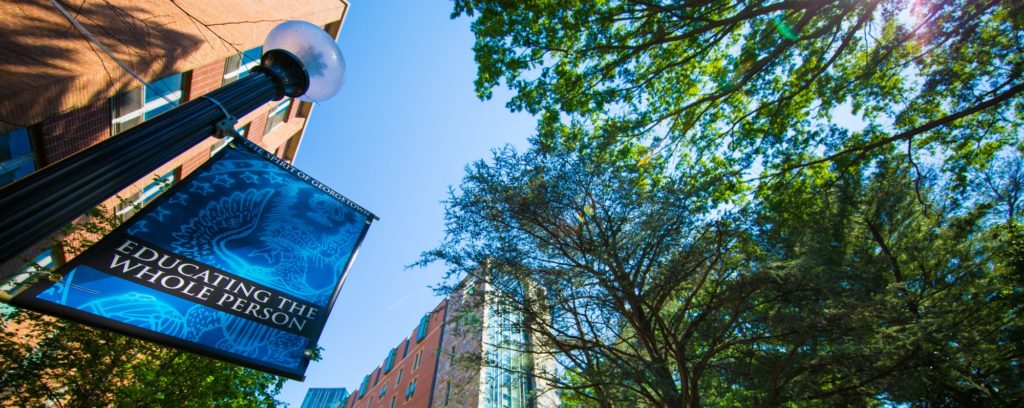
More Information
First Year Application Early Action Program Preparation Process Student Profile Application Fee Waiver Alumni Interviews Financial Aid Join Our Mailing List Georgetown Admissions Ambassador Program

Georgetown MBA Program Launches Applications for 2024 with Three New Essay Prompts
Samantha Krause
August 29, 2023
Georgetown MBA Admissions is now accepting Full-time , Flex MBA , and Flex MBA Online program applications for the fall 2024 semester. The application includes two new written and one new video essay prompt to provide prospective students with more opportunities to share their unique experiences, passions, and personal interests throughout the application process.
“The new essay prompts allow prospective students to dig deeper into their story and share more about the unique experiences and perspectives that shape who they are,” said Shelly Heinrich, associate dean for MBA Admissions and director of marketing. “Grounded in the Jesuit tradition, McDonough strives to educate the whole person – and that starts with telling your authentic story and what you hope to bring to the Georgetown community.”
This year’s written essays include three topics: focusing on Georgetown’s Jesuit value of Magis or achieving “more” or “greater” excellence; fostering a diverse community; and the legacy one hopes to achieve on the Hilltop. As with previous years, students only choose one essay to submit with their application materials.
Looking beyond professional and academic achievements, the video essay offers a unique opportunity to highlight an applicant’s interests outside of work. Prospective students are asked to share five to 10 random facts that are not on their resume that contribute to who they are as a professional and leader. The video essay builds upon the written essay options, which help the admissions team curate a unique portfolio of students who bring varying personal and professional life experiences to the program.
To increase program accessibility and reduce economic hardship, the MBA programs also offer application fee reductions and waivers for those with low to no income levels, are members of specific groups, and/or attend certain Georgetown McDonough events.
The Round 1 application deadline closes on October 2, 2023. Learn about the full application process by reviewing the necessary MBA application components .
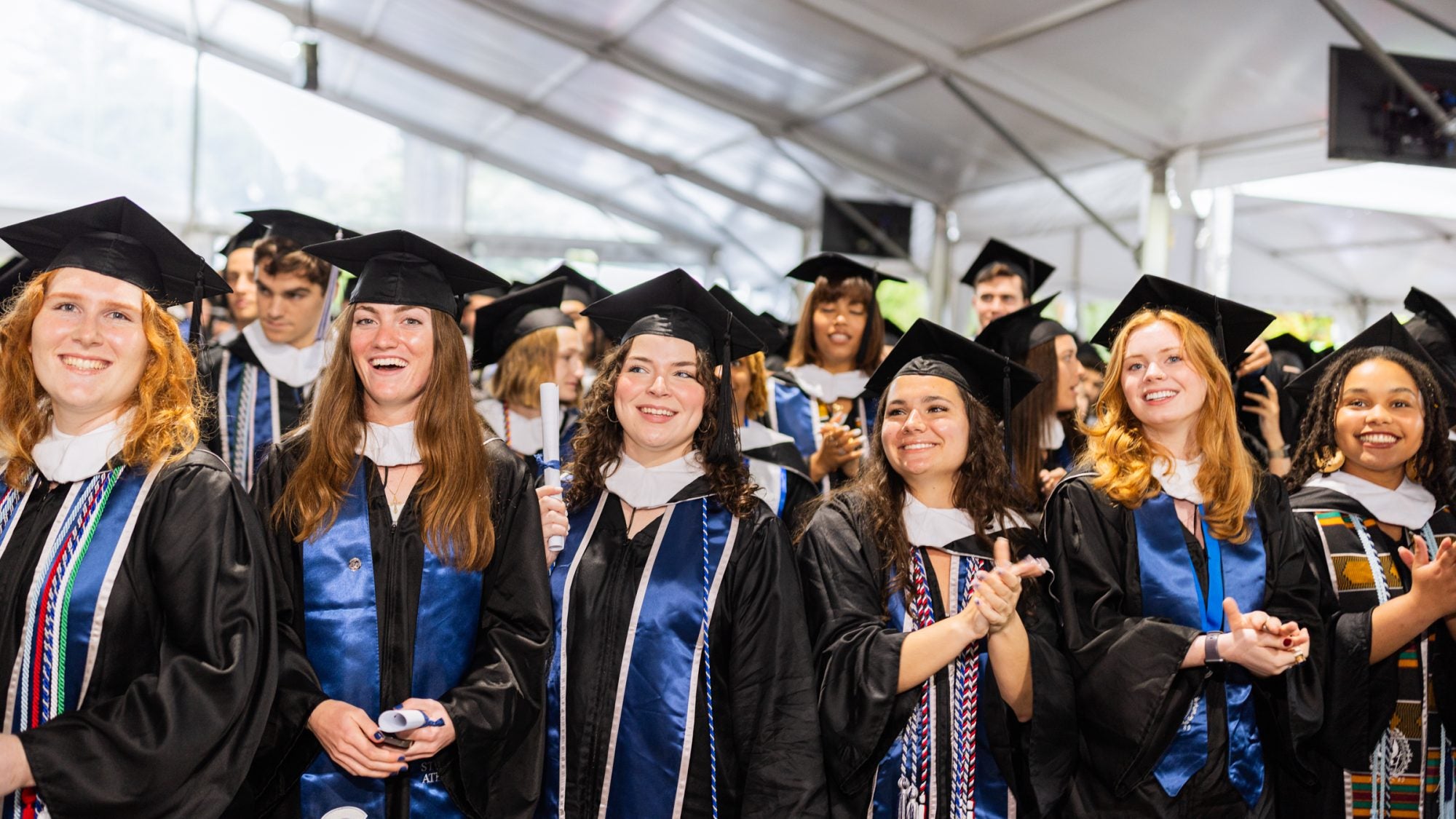
Title: Georgetown Celebrates the Class of 2024 at Commencement
“A class that Georgetown will forever be proud of. … Georgetown’s Class of 2024!”
Cheers and whoops filled the tent on May 16 as Provost Robert Groves announced this year’s graduates, who gathered for the first time as a class to celebrate their graduation.
The cheer-filled senior convocation marked the official start of graduation. From May 16-19, through sun and rain, the university conferred 6,252 degrees to undergraduate and graduate students.
“Members of the Georgetown Class of 2024, your moment is at hand. Congratulations!” Georgetown President John J. DeGioia said at convocation.
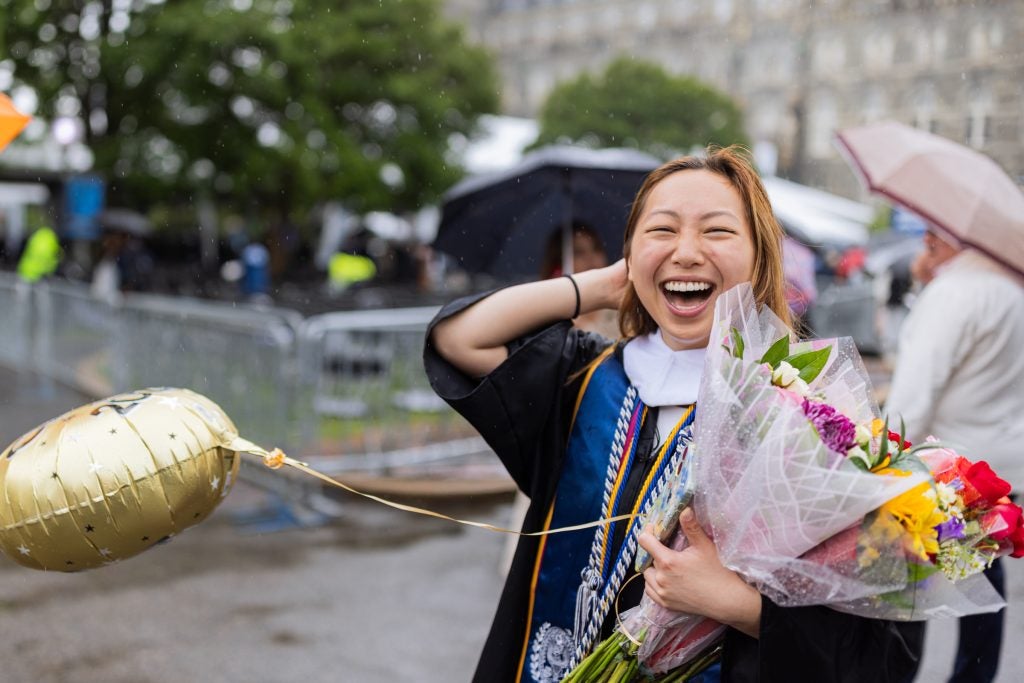
Each of Georgetown’s 10 schools celebrated individual commencement ceremonies over the weekend, featuring commencement speakers like Norah O’Donnell (C’95, G’03), CBS Evening News managing editor and anchor; Dr. Sanjay Gupta, CNN chief medical correspondent and host of the CNN podcast Chasing Life ; and Ngozi Okonjo-Iweala, director-general of the World Trade Organization.
“I know that I wouldn’t be who I am today without Georgetown University,” Alumna O’Donnell said to the School of Continuing Studies graduates. “It never gets old. The grandeur of Healy Hall, this beautiful university in the middle of the most important city in the world — what a privilege, what an honor, what an opportunity for each of you graduates as you take the next step in your journey.”

Hoyas Who Persevered
After starting Georgetown virtually during the COVID-19 pandemic, the Class of 2024 ended their academic careers with a slew of record-shattering accomplishments.
The 1,821 undergraduate and 4,431 graduate students represented a Rhodes scholar , three Marshall Scholars , 21 Fulbright recipients, newly commissioned military officers , first-generation college students , student-parents and tournament champions. But perhaps the greatest accomplishment, Groves said, was their perseverance.
“No class in recent history has faced the challenges you faced,” he said at senior convocation. “None is to be more warmly praised for what you have achieved. It is a class that Georgetown will forever be proud of.”
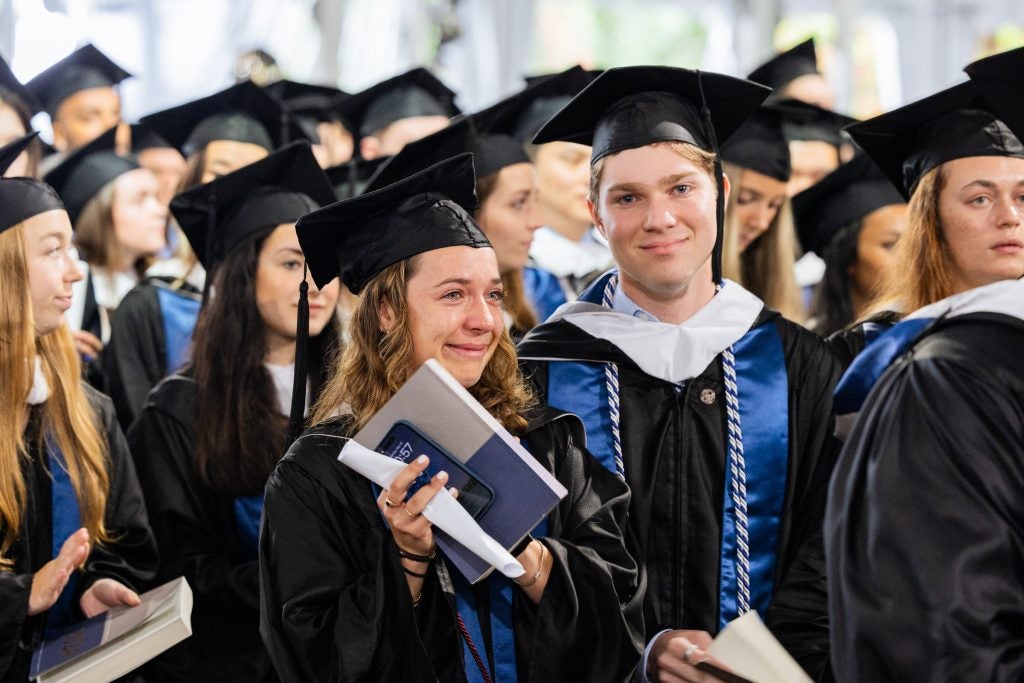
Watch Commencement Highlights
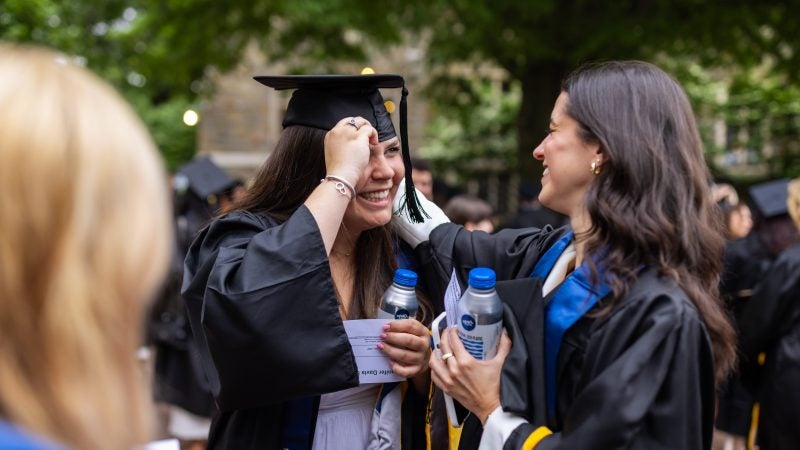
Senior Convocation at Graduation

Undergraduates in the Class of 2024 donned caps and gowns and belted out “Hoya! Saxa! at their senior convocation on May 16.
The class represented 49 states and 63 countries, with the youngest student graduating at age 20 and the oldest at age 44.
Together, the class completed almost 71,000 courses and nearly 172,000 credit hours.
The convocation began with a prayer from Chloe Schneider (C’24), president of the Georgetown University Jewish Student Association, and ended with a benediction from Ammar Hussain (SFS’24), former director of operations and management for Georgetown’s Office of Muslim Life.
Two students were chosen for their academic accomplishments to speak to the class: Vicka Heidt (C’24), a senior who won a Gates Cambridge Scholarship , and Asma Shakeel, SFS-Q’24, a senior at Georgetown University in Qatar who won a Rhodes Scholarship . Shakeel attended the ceremony but was unable to speak due to an illness.

Heidt, who has served as a caregiver for family members throughout her college career, spoke about the people past and present who have helped her class reach this point.
“While it will only be your name on your diploma, I ask that you think about the invisible names who uplifted you and helped you get to this day,” she said.
“The contemplation in action that is centered at Georgetown and your connection to Georgetown does not end when you walk out of those front gates. Ask yourself, how can you be the person that helps someone across that stage or this stage in the future?”
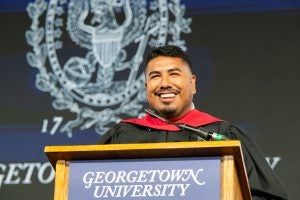
Alumnus Adan Gonzalez (C’15), a former White House Fellow and founder and executive director of the youth empowerment nonprofit, Puede Network, gave the alumni convocation address. Gonzalez shared his story of arriving at Georgetown with his clothes in trash bags , meeting people who believed in his potential, and helping others along the way.
“We can all leverage our own circles and communities to find solutions. My calling is empowering others through education. But there are many worthy causes. Our role starts in our communities. By serving as stewards to help others discover their own abilities,” he said. “Communities that need help don’t want to be saved tomorrow. They want to be empowered today.”
Celebrating Hoya Communities
Georgetown’s ceremonies were not limited to granting academic degrees. Over the month of May, the university also celebrated its communities.
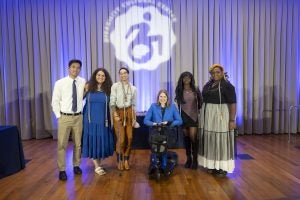
On April 24, the LGBTQ Resource Center hosted Lavender Graduation to celebrate the achievements, contributions and experiences of LGBTQ+ undergraduate and graduate students.
Over commencement weekend, Georgetown hosted commissioning ceremonies for new officers in the military. A ceremony that recognizes the disability community and the Class of 2024. Multicultural ceremonies for students of color and their loved ones. Georgetown Scholars Program ’s celebration, which supports low-income and first-generation college students. And Tropaia ceremonies for outstanding academic achievements.
In the last ceremony of the weekend, the Law Center’s, the president closed commencement with these words:
“As you reach this next stage, you carry this community, this way of life, with you,” DeGioia said in the last ceremony of the weekend. “May this be a source of consolation for you. May you always be reminded of your membership, here, in this university community.”
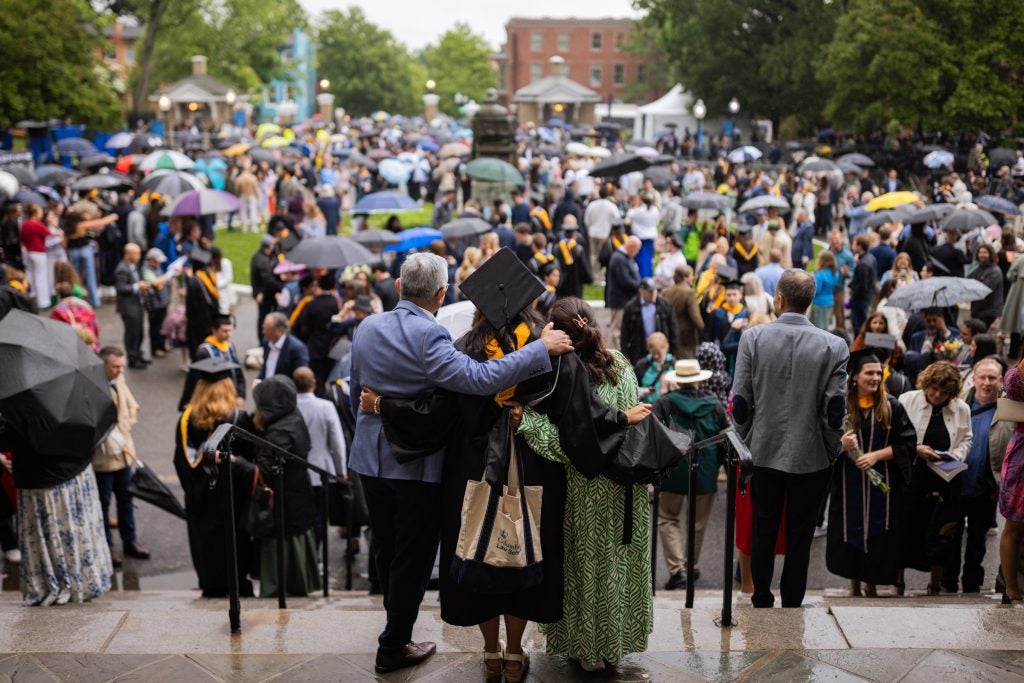
Meet the Class of 2024
“I’m feeling amazing. My whole family’s here from India. You work five years alone with your advisor, and at the end of it you get to celebrate with a lot of people. I feel proud that I can show them that. It feels like now I can accomplish anything I set my mind to.”
Anwita Mahajan (G’24), who’s graduating with her Ph.D. in economics from the Graduate School of Arts & Sciences
“Today is a stepping stone in my life. Coming from Lebanon, I knew I wanted to challenge myself and I knew Georgetown would be that place for me. Today I accomplished that, and I’m very proud of myself for it.”
Zina Yassine (L’24)
“I’m grateful for a community that not only sees my potential but challenges me and always offers a helping hand along the way.”
Hai Nguyen (SFS’23, MSFS’24)
“It’s a bittersweet feeling; it’s the end of an experience that has meant a lot to all of us, but it’s also sweet because we’re looking forward to a very promising future.”
Jeffery Garner (MBA’24)
“I’m really excited about graduation. Especially as a first-generation student, it’s an achievement not only for me but also for my family and the people before me. So I’m really grateful to even have this opportunity to graduate from Georgetown.”
Ariel Le (H’24)
“Instead of succumbing to despair, our community came together with resilience and determination. Despite the limitations of the pandemic, we found creative ways to continue our medical education and serve our community…. Although our experiences were unique, we weren’t deprived of the quintessential Georgetown medical journey.”
Paul Henderson (M’24)
“The contemplation in action that is centered at Georgetown and your connection to Georgetown does not end when you walk out of those front gates. Ask yourself, how can you be the person that helps someone across that stage or this stage in the future?”
Vicka Heidt (C’24)
“One of the greatest things about liberal studies is that it requires you to think in an interdisciplinary way. So you’re not just thinking about the economic influences or the sociological influences or the historic background, but you’re thinking about all those things together. So as a person running a national organization, those are considerations I need to have at the forefront all the time.”
Jennifer Kluge (G’24), graduating with her Doctor of Liberal Studies from the School of Continuing Studies
“As a Bradley Fellow, I expanded my global perspective through academic rigor, collaborative projects with peers and unique leader development opportunities. I am undoubtedly empowered and equipped to shape policy solutions and catalyze positive change as I advance in my career. Celebrating the profound journey thus far, I stand poised and eager to embrace the opportunities that lie ahead.”
Ephesian Poinsette (G’24), a graduate of the McCourt School of Public Policy
“I feel like if you sit a lot of new nurse practitioners in a room, the Georgetown graduates really stand out. I feel really prepared and I’m glad I chose Georgetown.”
Kayla Zmayefski (G’24), (left) who graduated from the School of Nursing
Fellowship and Scholarship Recipients
Georgetown’s Class of 2024 accumulated numerous awards and prestigious scholarships across their years, including:
1 Gates Cambridge Scholarship 4 Goldwater Scholars (with 1 August 2023 grad) 1 Schwarzman Scholar 1 Boren Scholar 1 Rhodes Winner 3 Marshall Winners 1 Rangel Fellow 21 Fulbright Scholars (with 2 August 2023 grads)
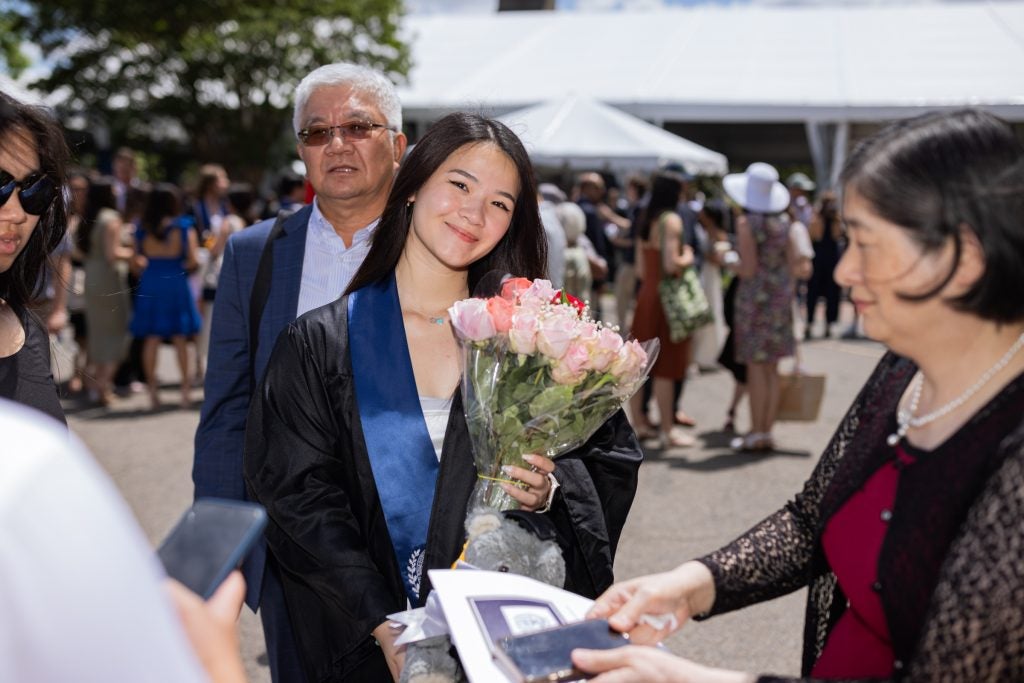
Class of 2024 By the Numbers
Students in the Class of 2024 represent 50 states and DC and 130 countries.
Each of Georgetown’s schools welcomed new graduates to an alumni community of more than 200,000 Hoyas.
The McCourt School of Public Policy celebrated 300 graduates:
- 161 masters of public policy;
- 47 masters in public management;
- 14 masters in international development policy;
- 29 masters of science in data science for public policy;
The Graduate School of Arts & Sciences conferred 414 degrees, including:
- 52 new Ph.D. holders;
- 141 masters of arts in the humanities and social sciences;
- 221 masters of science in the natural and computational sciences;
- 222 students from the Biomedical Graduate Education also received their degrees during the ceremony, including 48 doctor of philosophy degrees; 16 executive master’s in clinical quality, safety and leadership; 353 masters of science; and one master of arts.
The McDonough School of Business graduated conferred 1,255 degrees to 356 undergraduates and 899 graduate students, including
- 338 bachelor of science in business administration and 18 bachelor of science in business and global affairs;
- 55 executive MBAs;
- 18 executive masters in leadership;
- 169 masters of science in finance;
- 132 masters of science in management;
- 40 masters of arts in international business and policy;
- 100 masters of science in business analytics;
- 38 master of science in global real assets
The School of Continuing Studies conferred 1,112 degrees, including:
- 1,063 master of professional studies;
- 20 executive master of professional studies;
- 8 master of arts in liberal studies;
- 6 doctor of liberal studies;
- 15 bachelor of arts in liberal studies.
The Georgetown College of Arts & Sciences conferred 851 degrees, including:
- 662 bachelor of arts;
- 189 bachelor of science.
The School of Nursing celebrated 369 students, including
- 24 bachelors of science;
- 277 masters of science;
- 69 doctoral degrees.
The School of Health conferred 104 degrees, including
- 27 bachelors of science in global health;
- 30 bachelors of science in health care management and policy;
- 36 bachelors of science in human science;
- 11 masters of science in health systems administration.
The Walsh School of Foreign Service graduated 856 students, including:
- 438 bachelors of science in foreign service
- 267 masters of arts in security studies
- 136 masters of science in foreign service
- 21 masters of arts in Latin American Studies
- 21 masters of arts in German and European Studies
- 20 masters of arts in Eurasian, Russian and East European Studies
- 27 masters of arts in Arab Studies
The School of Medicine conferred 174 degrees, including
- 166 doctors of medicine;
- 8 students who received a dual degree with either an MD/Ph.D. or MD/MPH.
Georgetown Law awarded 1,259 degrees, including:
- 672 earned their J.D;
- 579 earned their masters of law;
- 5 earned their doctor of juridical science
In its May 9 commencement ceremony , Georgetown University in Qatar conferred 140 degrees, including
- 119 bachelors of science in foreign service;
- 21 executive masters in diplomacy and international affairs.
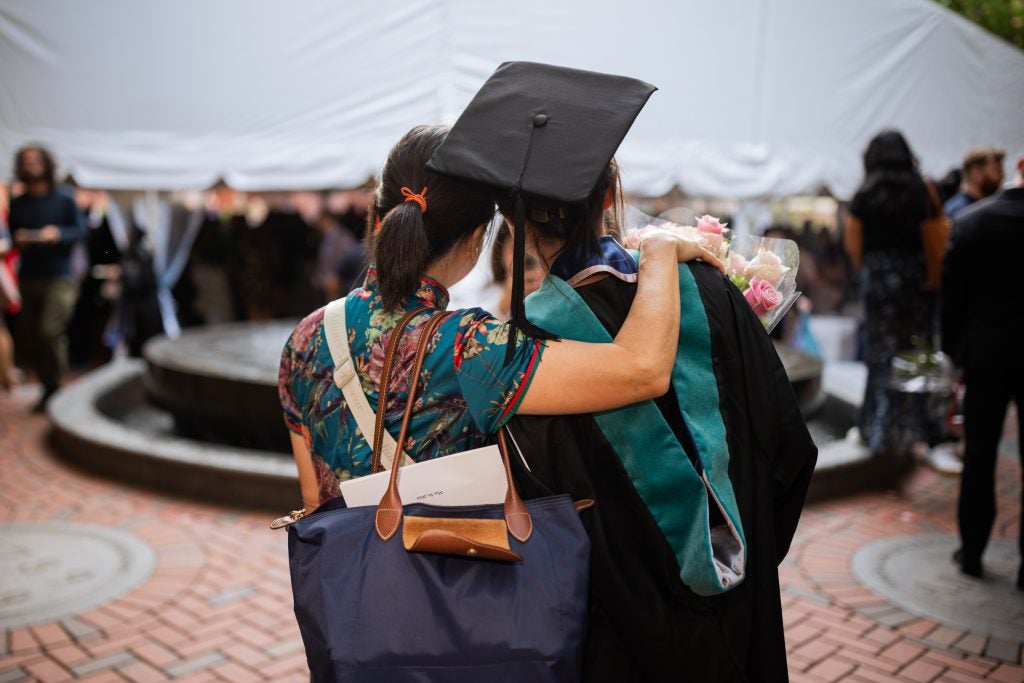
Celebrating the Class of 2024
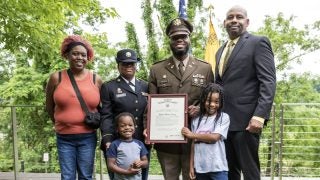
Active-Duty Soldier, Now Georgetown Alum, Achieves Lifelong Dream To Be an Army Officer

The Graduating Senior, Journalist Who Once (Or Twice) Skipped Class to Cover Biden at the White House
Meet the class of 2024: the must-read stories from georgetown’s graduating seniors.
- Class of 2024 ,
- Commencement
- Skip to main content
- Skip to "About this site"
- Departments
Language selection
- Search and menus
20-year-old arrested for Georgetown Arson.
May 27, 2024 Georgetown , Prince Edward Island
News release
On May 25, 2024, at 5:10 p.m., Kings District RCMP responded to a structure fire at an abandoned residence in Georgetown. Police quickly learned of evidence of arson and identify suspect. Police located a 20-year-old who was taken into custody after resisting arrest and threatening police with a shovel. The 20-year-old will appear in court later today to answer to charges of arson, resisting arrest and assault with a weapon.
The Three Rivers Fire Department responded to this incident. This structure was completely destroyed.
Contact information
Corporal Gavin Moore Media Relations Officer Royal Canadian Mounted Police - Prince Edward Island
Georgetown Law
Commencement 2024: georgetown law graduates celebrate, reflect on social change and the law.
May 22, 2024
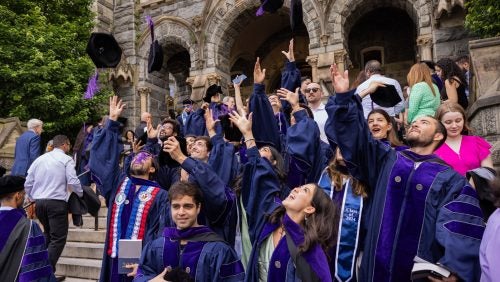
Class of 2024 graduates throw their caps in the air at Commencement. Photo credit: Elman Studio.
“Your formal education may end today, but you are not done learning,” urged Federal Reserve Chair Jerome Powell, L’79, H’24, in his address to Georgetown Law’s class of 2024. More than 1,100 spring graduates — including 641 J.D. candidates as well as 516 master of laws and 8 doctor of juridical science candidates — gathered on Georgetown University’s historic Hilltop campus to celebrate commencement on Sunday, May 19.
Powell, who has chaired the Federal Reserve System since 2018, reflected fondly on his Georgetown Law experience — from serving as editor in chief of The Georgetown Law Journal to dancing the “Time Warp” at screenings of the cult classic musical The Rocky Horror Picture Show at the now-closed Key Theatre near the Hilltop.
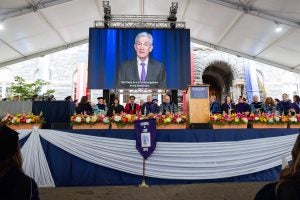
Federal Reserve Chair Jerome Powell, L’79, H’24, delivered remarks via video. Photo credit: Elman Studio.
Having tested positive for COVID-19, Powell delivered his remarks to the regalia-clad crowd virtually and received an honorary doctorate of laws degree in absentia .
Powell urged the new alumni to remain undaunted by new challenges and leadership experiences. “Assume that you will make mistakes,” he advised. “Learn from those mistakes; do not dwell excessively upon them in regret. You will fall down. Get up. Repeat cycle.”
And he encouraged the class of 2024 to work to improve the world around them. “Each of you has the capability to achieve success in any field you choose,” he said. “It is important that you also consider how to give back and use your gifts to make a difference.”
Watch the full Georgetown Law Commencement Ceremony here .
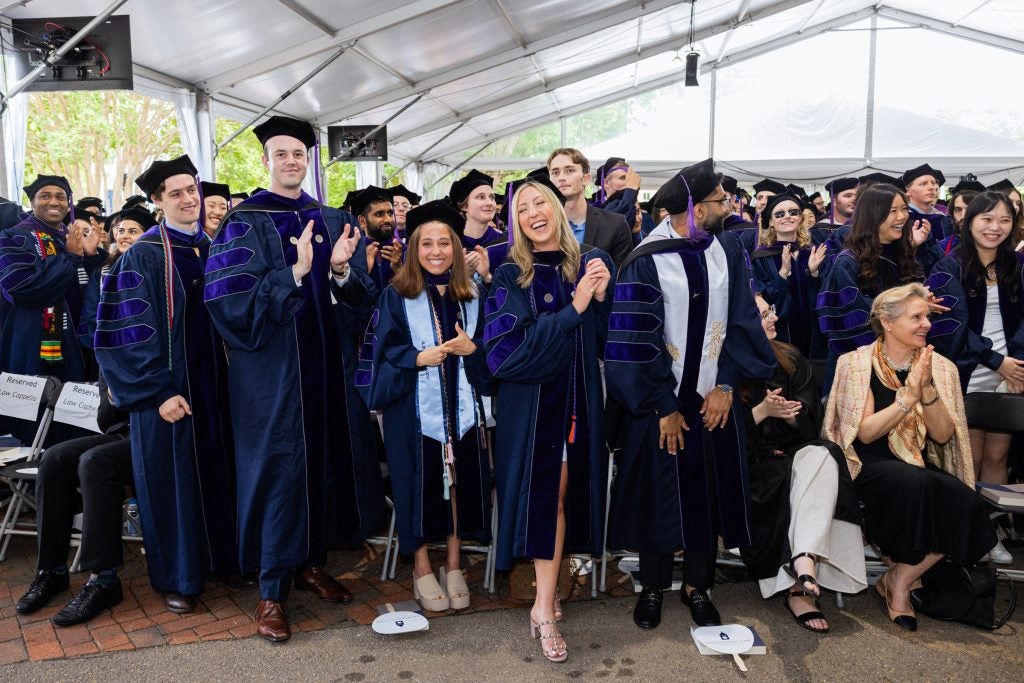
Students gathered on Georgetown University’s historic Hilltop campus. Photo credit: Elman Studio.
Celebrating a higher purpose
The call to use their legal training on behalf of others resonated with many graduates, who reflected on Georgetown Law’s public service and experiential learning opportunities as the highlight of their law school experience.

Aubrianna Mierow (second from left), L’24, credited the RISE program with helping her succeed in law school.
For Aubrianna Mierow, L’24, who took part in the Criminal Justice Clinic during her 3L year, the opportunity to represent defendants in court was a chance to practice real-life legal advocacy — and overcome any doubt that she would struggle to succeed as a lawyer.
“My own lived experiences are why I want to become a lawyer in the first place,” said Mierow, a member of the RISE program, which serves students who may have had less exposure to the legal profession before law school. “RISE provided me with a community my 1L year that has carried me throughout law school and that I know will carry me through my beginning stages as a lawyer.”
Public service was also central to Sunday’s celebration of Philip Hirschkop , L’64, H’24, who received an honorary doctorate of laws degree in recognition of his work on behalf of women, teachers and veterans, among others.
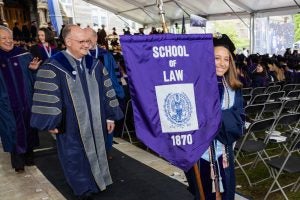
Georgetown University President John J. DeGioia (left) and Student Bar Association President Stephanie Houghton (right), L’24. Photo credit: Elman Studio.
Hirschkop, a student activist, launched his civil rights law career shortly after graduation when he served as co-counsel (with fellow Law Center graduate Bernard Cohen, L’61) to Mildred and Richard Loving in their 1967 Supreme Court case to legalize interracial marriage, Loving v. Virginia . “Throughout his career, Hirschkop chose to represent clients based on his principles, no matter the risk to his career or livelihood,” said Professor Sheryll Cashin in introducing Hirschkop to the enthusiastic audience.
Nine graduating students shared reflections on their time at the Law Center and their plans for the future — click here to read and watch.
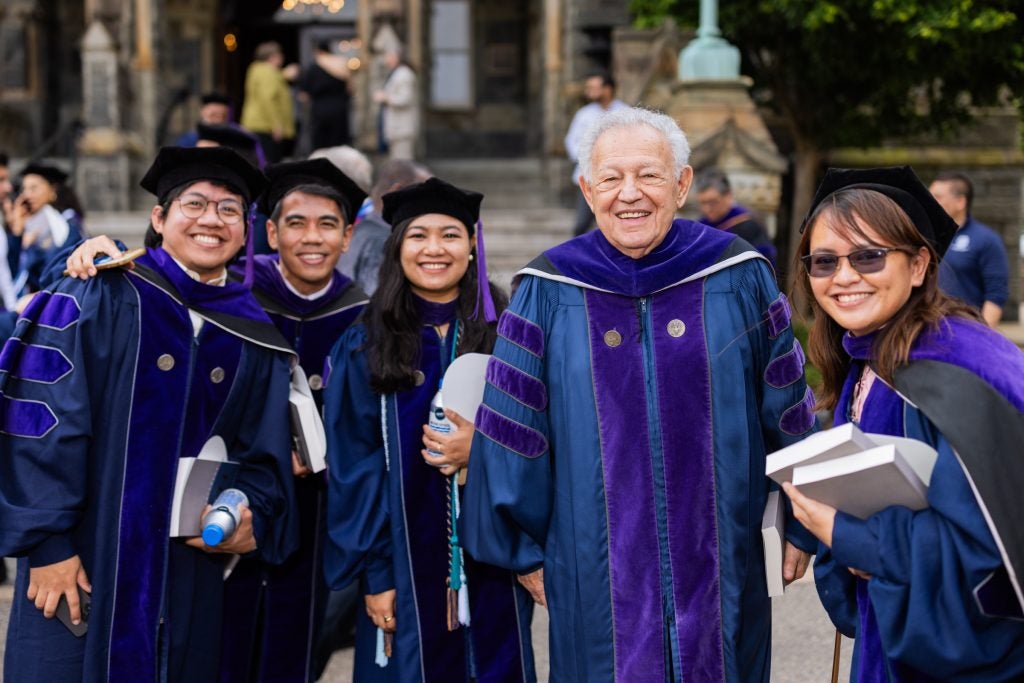
Philip Hirschkop (fourth from left), L’64, H’24, celebrated with students. Photo credit: Elman Studio.
‘At the crux of everything’
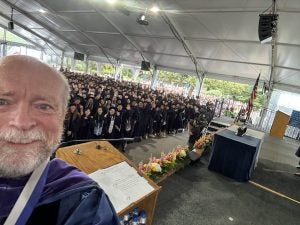
Dean William M. Treanor posed for a selfie following each Celebration Days ceremony.
Prior to Sunday’s ceremony, students gathered with family and loved ones for Celebration Days : ten smaller ceremonies held Friday and Saturday on the Georgetown Law campus, where each graduate could hear their name called and walk across the stage to collect their diploma. In keeping with the tradition he began last year , Dean William M. Treanor concluded each ceremony by snapping a selfie with the crowd.
For many graduates, Celebration Days also offered the chance to celebrate with the section-mates and classmates who began as strangers but became close friends.
“It feels pretty amazing,” said Christopher Bilicic, L’24, of the chance to graduate alongside his friend and Section 1 classmate Kamal Rettrey, L’24. “We were in the trenches together every day, in every class.”
“Whenever we had stressors, we would always call each other and be there for each other,” added Rettrey. “It was really like having a brother to have your back.”
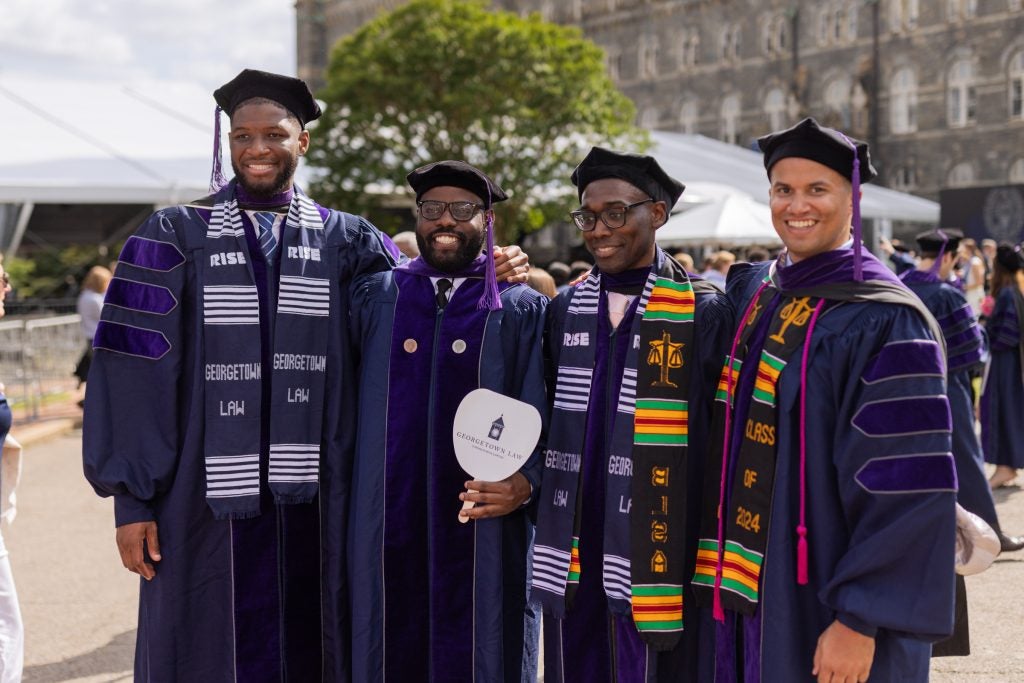
L-R: Lewis Ntolla, L’24, Stevelle Steer, L’24, Kamal Rettrey, L’24, and Robert Hunter, L’24. Photo Credit: Elman Studio.
The Celebration Days ceremonies also featured student speakers who reflected on their shared experiences — whether the J.D. students’ grueling first-year contracts and civil procedure classes, or the challenges of adjusting to life in a new country for LL.M. students , many of whom are foreign-trained attorneys.
Representing the Section 3 alternative “ Curriculum B ” cohort was student speaker Nick Endo, L’24, who noted his desire to attend law school in order to advocate for racial justice — a motivation inspired by the incarceration of his grandmother and the some 120,000 Japanese-Americans forcibly relocated during World War II.

Graduates walked across the stage — some with children in tow — to collect their diplomas at Celebration Days ceremonies.
“Things got easier the further I advanced in law school,” he told the audience. “Not because the workload got lighter — it somehow got worse — but because my list of ‘whys’ was growing exponentially longer … I invite you to take a moment now and think about the ‘whys’ that brought you here to the Law Center and the ‘whys’ that kept you going.”
For Section 4 student speaker Wala Hassan, L’24, one of those “whys” was a poverty law class with Professor Peter Edelman , who helped found Head Start, the federal preschool program for low-income children — the same program that Hassan attended as a child, and that she credits with kindling the academic journey that led her to Georgetown Law. This was Edelman’s final year in the classroom, as he is retiring after more than four decades on the Georgetown Law faculty.
“Meeting Professor Edelman made me realize that at the crux of everything is a lawyer. Lawyers are on the forefront of change,” she said in her remarks. “When you’re faced with tough decisions that further injustice or fight for justice, you have incredible power in your choices … You, my fellow future lawyers, are now at the crux of everything.”
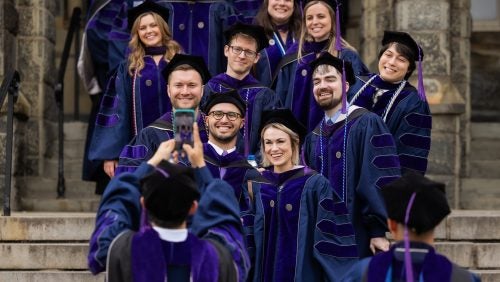
Students pose for a photo on the Georgetown University campus. Photo credit: Elman Studio.
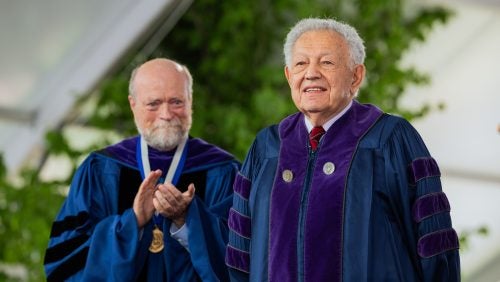
Dean William M. Treanor (left) and honorary degree recipient Philip Hirschkop (right), L’64, H’24. Photo credit: Elman Studio.
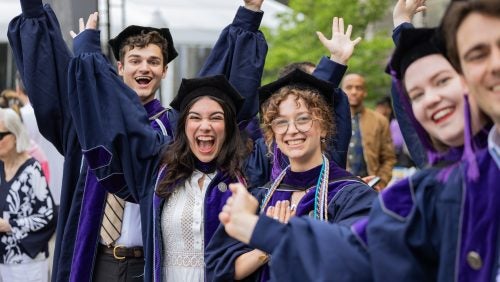
Celebrating with classmates. Photo credit: Elman Studio.
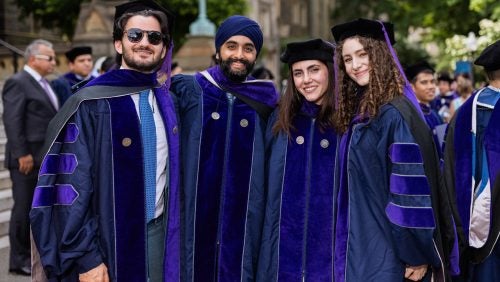
A proud day. Photo credit: Elman Studio.

Loved ones of all ages showed their support.
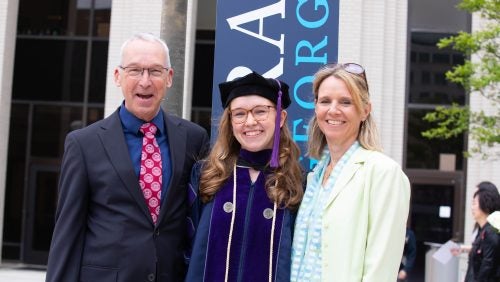
Family and friends celebrated with graduates at Celebration Days ceremonies.
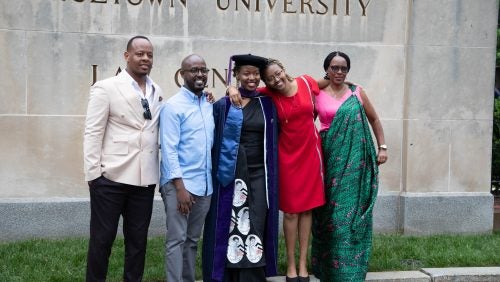
Graduates and their loved ones posed for photos on the Georgetown Law campus.
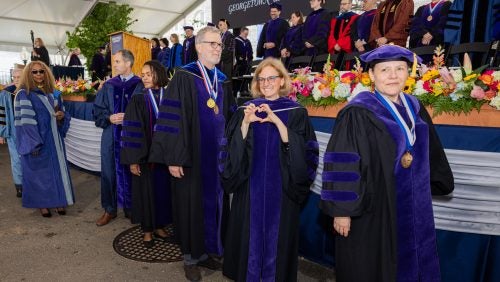
Georgetown Law's Director for Mission and Ministry Amy Uelmen (center), C’90, L’93, S.J.D.’16, delivered the benediction at Sunday's ceremony. Photo credit: Elman Studio.
What are your chances of acceptance?
Calculate for all schools, your chance of acceptance.
Your chancing factors
Extracurriculars.
How to Write Georgetown’s Personal or Creative Essay
This article was written based on the information and opinions presented by Alexander Oddo in a CollegeVine livestream. You can watch the full livestream for more info.
What’s Covered:
- What You Can Write About for Georgetown’s Personal Essay
- Do I Have to Write About Diversity?
- How Can I Write This as a Diversity Essay?
Georgetown’s final supplemental essay prompt, often referred to as their Diversity Essay, asks:
As Georgetown is a diverse community, the Admissions Committee would like to know more about you in your own words. Please submit a brief essay, either personal or creative, which you feel best describes you. (1 page, single-spaced)
Remember, this is only one of many essays required to submit a Georgetown application. Have questions about the other Georgetown essays? Read CollegeVine’s Guide to Georgetown’s Essays or these Examples of Great Georgetown Essays .
What You Can Write About for Georgetown’s Personal Essay
This is an open-ended, personal essay prompt. As such, applicants should use this essay to describe who they are. Because Georgetown has a standalone application, this is a great place to reuse or repurpose parts of your Common App essay .
If in your Common App essay you responded to prompts one, two, three, or five — which focus on personal traits, overcoming challenges, questioning beliefs, and accomplishments — it can likely be submitted without changes. There is no need to edit it to include keywords from the Georgetown essay prompt.
Need help with your Common App essay? You can find CollegeVine’s post about how to write all of the Common Application essays .
Do I Have to Write About Diversity?
No. Georgetown is a diverse campus with many students from different backgrounds and perspectives. However, this is not a diversity essay. Getting tripped up by the first sentence of the prompt is a common mistake students make. Applicants should avoid feeling boxed in by the prompt, its main purpose is to further help the admissions committee better understand who you are, what you care about, and what you will bring to their community.
How Can I Write This as a Diversity Essay?
For some applicants, answering this prompt as a diversity essay may feel natural and make sense. In that case, consider what you are trying to convey to the reader.
To do this, first think about what makes you stand out among other applicants. This could include hobbies, perspectives, experiences, languages, family, or personality traits. The topic of your essay does not have to be crazily unique. It just has to be something fundamental to who you are.
As with all essays, showing is better than telling. Think about a story that exemplifies the aspect of yourself you want to highlight. Illustrate your experience to the reader through an anecdote, rather than just stating what is important to you. From there, discuss how this aspect of yourself shapes your outlook and actions. It must be important to who you are as a person, or you would not have chosen to write about it here. How does it influence your life now, and how would it continue to do so on their campus?
For more tips and writing do’s and don’ts, check out CollegeVine’s post about how to write The Diversity College Essay .
Related CollegeVine Blog Posts

Missing Georgetown Co. woman found

GEORGETOWN COUNTY, S.C. (WCSC) - The Georgetown County Sheriff’s Office is says they have found a missing woman.
Deputies say the 22-year-old was found safe and will be returned home.
Copyright 2024 WCSC. All rights reserved.

Charleston Co. deputies investigating fatal early-morning shooting

Investigation of Paul Murdaugh causes lawsuit connected to Mallory Beach case

‘General Hospital’ actor Johnny Wactor shot, killed during attempted robbery, reports say

2 teens, 18-year-old shot after mom found daughter’s boyfriend secretly sleeping in her bed, police say

Summerville man arrested following hostage situation at apartment complex
Latest news.

Charleston Co. deputies to expand license plate cameras to James Island

Police investigating fatal auto-pedestrian crash on Savannah Highway

VIDEO: Police investigating fatal auto-pedestrian crash on Savannah Highway

Missing monkey in Walterboro captured, county confirms

VIDEO: Monkey missing from Walterboro captured, county confirms
Watch CBS News
San Bernardino high schooler headed to Harvard after acceptance to dozens of universities
By Joy Benedict
May 24, 2024 / 5:38 PM PDT / KCAL News
As thousands of high schoolers prepare to graduate and move on to college, one San Bernardino student has made her dream come true after accepting an offer to one of the nation's most prestigious universities.
Silvana Vazquez, currently a senior at San Gorgonio High School, was accepted to more than 30 different schools before she was accepted to Harvard University.
Despite all of her hard work over the last four years, she's still shocked that she beat the odds in the extremely competitive admissions process.
"I at first though it was such a long shot, but the first one for me was Harvard," Vazquez said. "That has been my dream school for seven years — since fifth grade — I just knew I had to put that on the top of my list."
That list was quite lengthy, as she applied to 41 schools overall and was accepted to 32. Some other options included the University of Pennsylvania, Georgetown University, Notre Dame and UCLA.
Still, she didn't think her dreams were practical, as less than 2,000 of the more than 50,000 were accepted into this year's freshman class.
"I didn't think it was a realistic option because I tend to compare myself with other students. ... I mean, I met someone who owned their own foundation or their own nonprofit," Vazquez explained.
Even with the doubt clouding what became reality, people who knew her said it's not a surprise at all.
"I felt she was deserving, and if anyone could have done it, she would have been that person," said Diane Dawson, who teaches history at SGHS.
She says that to her knowledge, no other San Gorgonio student has gotten into Harvard. The school is located in an underserved community of San Bernardino, where 88% of students are eligible for free and reduced lunch.
Nearly a quarter of San Bernardino City Unified School District students fall below the poverty line, and 20% are English language learners, meaning they have to take special classes because they aren't proficient in English. Vazquez was once in the same boat.
"When I entered kindergarten, I knew very little English but I made sure to put in my effort to learn" she said, noting that she took those classes until she got into 4th grade and tested into the district's regular curriculum. "They would pull me out and have me speak English and learn more English. I'm grateful I had to do it early."
Now, she's the school valedictorian after ranking first in her class with a 4.87 GPA and will become the first member of her family to go to college, all on a full ride scholarship. She credits her passion for learning to her parents.
"They always told me it doesn't matter where you go, we'll always be proud of wherever you go as long as we see you thrive in education," she said. "What I believe got me into Harvard was my passion to serve my community. What I wore in the short essays to Harvard was how passionate I am to be able to serve and represent the impoverished communities of San Bernardino and my school."
Part of that passion comes from watching her father's dedication to his family.
"My dad works at a gas station, he provides a lot for the family," Vazquez said. "He wakes up at four in the morning, comes back at four p.m., because he's done a lot to give me and my siblings a lot."
Vazquez will graduate next week with honors and a future as bright as she chooses to make it.
Featured Local Savings
More from cbs news.

Probe underway into two robberies at 7-Eleven locations in Long Beach

San Fernando man arrested for shooting five people and firing at LAPD helicopter

San Bernardino County teen arrested for trying to steal deputy's patrol car during street takeover

Ontario parents outraged at plea deal after suspected school shooting plot

The Best Books of the Year (So Far)
The nonfiction and novels we can’t stop thinking about.
Supported by
- Share full article
By The New York Times Books Staff
- May 24, 2024
Fiction | Nonfiction
We’re almost halfway through 2024 and we at The Book Review have already written about hundreds of books. Some of those titles are good. Some are very good. And then there are the following.
We suspect that some (though certainly not all) will be top of mind when we publish our end-of-year, best-of lists. For more thoughts on what to read next, head to our book recommendation page .

James , by Percival Everett
In this reworking of the “Adventures of Huckleberry Finn,” Jim, the enslaved man who accompanies Huck down the Mississippi River, is the narrator, and he recounts the classic tale in a language that is his own, with surprising details that reveal a far more resourceful, cunning and powerful character than we knew.
Local bookstores | Barnes and Noble | Amazon
Good Material , by Dolly Alderton
Alderton’s novel, about a 35-year-old struggling to make sense of a breakup, delivers the most delightful aspects of romantic comedy — snappy dialogue, realistic relationship dynamics, funny meet-cutes and misunderstandings — and leaves behind clichéd gender roles and the traditional marriage plot.
Martyr! , by Kaveh Akbar
A young Iranian American aspiring poet and recovering addict grieves his parents’ deaths while fantasizing about his own in Akbar’s remarkable first novel, which, haunted by death, also teems with life — in the inventive beauty of its sentences, the vividness of its characters and the surprising twists of its plot.
The Hunter , by Tana French
For Tana French fans, every one of the thriller writer’s twisty, ingenious books is an event. This one, a sequel to “The Searcher,” once again sees the retired Chicago cop Cal Hooper, a perennial outsider in the Irish west-country hamlet of Ardnakelty, caught up in the crimes — seen and unseen — that eat at the seemingly picturesque village.
Wandering Stars , by Tommy Orange
This follow-up to Orange’s debut, “There There,” is part prequel and part sequel; it trails the young survivor of a 19th-century massacre of Native Americans, chronicling not just his harsh fate but those of his descendants. In its second half, the novel enters 21st-century Oakland, following the family in the aftermath of a shooting.
Headshot , by Rita Bullwinkel
Set at a women’s boxing tournament in Reno, Nev., this novel centers on eight contestants, and the fights — physical and emotional — they bring to the ring. As our critic wrote: This story’s impact “lasts a long time, like a sharp fist to your shoulder.”
Beautyland , by Marie-Helene Bertino
In 1970s Philadelphia, an alien girl sent to Earth before she’s born communicates with her fellow life-forms via fax as she helps gather intel about whether our planet is habitable. This funny-sad novel follows the girl and her single mother as they find the means to persevere.
Knife: Meditations After an Attempted Murder , by Salman Rushdie
In his candid, plain-spoken and gripping new memoir, Rushdie recalls the attempted assassination he survived in 2022 during a presentation about keeping the world’s writers safe from harm. His attacker had piranhic energy. He also had a knife. Rushdie lost an eye, but he has slowly recovered thanks to the attentive care of doctors and the wife he celebrates here.
Everyone Who Is Gone Is Here: The United States, Central America, and the Making of a Crisis , by Jonathan Blitzer
This urgent and propulsive account of Latin American politics and immigration makes a persuasive case for a direct line from U.S. foreign policy in Central America to the current migrant crisis.
The Wide Wide Sea: Imperial Ambition, First Contact and the Fateful Final Voyage of Captain James Cook , by Hampton Sides
By the time he made his third Pacific voyage, the British explorer James Cook had maybe begun to lose it a little. The scientific aims of his first two trips had shifted into something darker. According to our reviewer, the historian Hampton Sides “isn’t just interested in retelling an adventure tale. He also wants to present it from a 21st-century point of view. ‘The Wide Wide Sea’ fits neatly into a growing genre that includes David Grann’s ‘ The Wager ’ and Candice Millard’s ‘ River of the Gods ,’ in which famous expeditions, once told as swashbuckling stories of adventure, are recast within the tragic history of colonialism .”
The Rebel’s Clinic: The Revolutionary Lives of Frantz Fanon , by Adam Shatz
This absorbing biography of the Black psychiatrist, writer and revolutionary Frantz Fanon highlights a side of him that’s often eclipsed by his image as a zealous partisan — that of the caring doctor, who ran a secret clinic for Algerian rebels.
Fi: A Memoir , by Alexandra Fuller
In her fifth memoir, Fuller describes the sudden death of her 21-year-old son. Devastating as this elegant and honest account may be — it’s certainly not for the faint of heart — it also leaves the reader with a sense of having known a lovely and lively young man.
Explore More in Books
Want to know about the best books to read and the latest news start here..
An assault led to Chanel Miller’s best seller, “Know My Name,” but she had wanted to write children’s books since the second grade. She’s done that now with “Magnolia Wu Unfolds It All.”
When Reese Witherspoon is making selections for her book club , she wants books by women, with women at the center of the action who save themselves.
The Nobel Prize-winning author Alice Munro, who died on May 14 , specialized in exacting short stories that were novelistic in scope , spanning decades with intimacy and precision.
“The Light Eaters,” a new book by Zoë Schlanger, looks at how plants sense the world and the agency they have in their own lives.
Each week, top authors and critics join the Book Review’s podcast to talk about the latest news in the literary world. Listen here .
Advertisement

IMAGES
COMMENTS
All Applicants. Prompt 1: Briefly discuss the significance to you of the school or summer activity in which you have been most involved. ( 1/2 page, single-spaced) Prompt 2: As Georgetown is a diverse community, the Admissions Committee would like to know more about you in your own words.
This blog will discuss Georgetown's essay prompts for the 2023-2024 academic year. Think of these essays as your personal spotli ght—a chance ... The Georgetown essay prompt for the 2023-2024 admissions cycle is an invitation for applicants to share a more personalized and comprehensive view of themselves beyond their academic achievements ...
Georgetown 2023-24 Application Essay Question Explanations. *Please note: the information below relates to last year's essay prompts. As soon as the 2024-25 prompts beomce available, we will be updating this guide -- stay tuned! The Requirements: 1 essay of 250 words; 1 half-page essay; 2 page-long essays. Supplemental Essay Type (s): Activity ...
This guide covers how to write each of the Georgetown supplemental essay prompts with exercises and essay examples to help you along the way. Services. ... We learn, for example, that the writer worked with "3-6" year olds in the third paragraph of the essay. But rather than simply saying, "they asked me a lot of questions," the writer ...
Each year, Georgetown receives thousands of applications from students with stellar grades. By asking such a question through the Georgetown essays 2023-2024, the school is interested to know the kind of impact you've made in your community in order to distinguish you from the rest of the applicants. The school wants to know what part of your ...
The First Year Application deadline of January 10, 2024 has passed. All students who applied for the class of 2028 will receive their decision through the student portal no later than April 1. If you need to make any changes to your First Year Application for Fall 2024, please visit your student portal to submit the Application Change Form, or ...
Full Essay #2. You're almost to the finish line, now, but this second essay is a bit of a "choose your own adventure.". Well, that's the fun way to put it. Technically speaking, incoming first-years must apply to one of five schools within Georgetown, so your second essay depends on which program you'd like to enter.
Georgetown University has released its 2023-2024 admissions essays for applicants to the Class of 2028.The Jesuit institution, which has for years bucked the trend of joining The Common Application, asks applicants to respond to three essays in addition to one essay that is school-specific within the broader university.So, what are this year's essay prompts?
Description. Join college consultant Alexander Oddo and CollegeVine co-founder Vinay Bhaskara to learn how to write effective, compelling, and admission worthy responses to the 2022-2023 Georgetown essays! This stream will be interactive so be sure to drop all your questions in the chat below.
The Georgetown essays include one short essay of about a half-page, single-spaced, one longer one-page essay required of all students, and a second one-page essay specifically tied to one of Georgetown's four schools: Georgetown College, the School of Nursing and Health Studies, Walsh School of Foreign Service, and the McDonough School of Business.
What's Covered: Essay Example 1 - Special Talents. Essay Example 2 - Personal Statement. Essay Example 3 - The Meaning of Being Educated. Essay Example 4 - Speech and Debate. Where to Get Feedback on Your Essay. Georgetown is a prestigious university located right outside of Washington D.C. that is known for its great public policy ...
Sample Essays. The breadth of Georgetown's core curriculum means that students are required to write for a wide variety of academic disciplines. Below, we provide some student samples that exhibit the key features the most popular genres. When reading through these essays, we recommend paying attention to their . 1.
Below are Georgetown's essay prompts for the 2023-24 admissions cycle along with tips about how to address each one. Georgetown Supplemental Essays - Prompt 1. ... International service is not something every 17/18-year-old in the country is dreaming about doing as a vocation. There is likely a very interesting story surrounding what ...
1. High School Preparation. While the Committee on Admissions is most interested in the quality of a student's work, general promise, and seriousness of purpose, it is recommended that secondary school preparation include four years of English, a minimum of two years of social studies, modern language, and mathematics and one year of natural science.
Georgetown is a highly competitive university that receives thousands of applications each year with the same perfect GPAs and test scores. Essays are the chief way admissions officers can distinguish between applicants and decide which students they want at their university. In this post, we'll cover how to write engaging and impressive ...
Here is a breakdown of the word count for the Georgetown supplemental essays: Short Essay - approximately ½ page, single spaced. Essay 1- approximately 1 page, single spaced. Essay 2- approximately 1 page, single spaced, response based on intended school.
A Guide to the Georgetown Essays 2020-2021. Year after year, Georgetown University remains one of the most prestigious universities in the country. Understandably, gaining admission is not easy — Georgetown has an acceptance rate of only 15% (and reached a record low of 12% last year).
We encourage you to thoroughly read the important information about the application process, policies and procedures. If you are unable to find the information that you are looking for on our website, you may contact the Office of Undergraduate Admissions at (202) 687-3600 and request to speak with an admissions officer.
First Year Applicant. Georgetown Application. Georgetown offers students the opportunity to apply in two ways: or Regular Decision. Regardless of which option you choose, we encourage you to begin your application by submitting the as soon as possible. Filling out and submitting the Georgetown Application should only take you a few minutes.
Georgetown MBA Admissions is now accepting Full-time, Flex MBA, and Flex MBA Online program applications for the fall 2024 semester. The application includes two new written and one new video essay prompt to provide prospective students with more opportunities to share their unique experiences, passions, and personal interests throughout the application process. "The new essay […]
2023-2024 Georgetown Secondary Essay Prompts 1. Are you/will you be enrolled in any program during the 2023-2024 academic year? 2. Have you ever completed one of the following Georgetown Programs? (check all that apply): The Georgetown University Academy for Research, Clinical, and Health Equity Scholarship (ARCHES)
May 20, 2024. "A class that Georgetown will forever be proud of. …. Georgetown's Class of 2024!". Cheers and whoops filled the tent on May 16 as Provost Robert Groves announced this year's graduates, who gathered for the first time as a class to celebrate their graduation. The cheer-filled senior convocation marked the official start ...
On May 25, 2024, at 5:10 p.m., Kings District RCMP responded to a structure fire at an abandoned residence in Georgetown. Police quickly learned of evidence of arson and identify suspect. Police located a 20-year-old who was taken into custody after resisting arrest and threatening police with a shovel.
"Your formal education may end today, but you are not done learning," urged Federal Reserve Chair Jerome Powell, L'79, H'24, in his address to Georgetown Law's class of 2024. More than 1,100 spring graduates — including 641 J.D. candidates as well as 516 master of laws and 8 doctor of juridical science candidates — gathered on Georgetown University's historic Hilltop campus to ...
Georgetown's final supplemental essay prompt, often referred to as their Diversity Essay, asks: As Georgetown is a diverse community, the Admissions Committee would like to know more about you in your own words. Please submit a brief essay, either personal or creative, which you feel best describes you. (1 page, single-spaced) Remember, this ...
Reporting from Washington. May 20, 2024. Long before the Education Department's overhaul of the federal student aid application fell apart this year, officials who now lead the department were ...
GEORGETOWN COUNTY, S.C. (WCSC) - The Georgetown County Sheriff's Office is asking for the public's help in locating a missing 22-year-old woman. Makayla Cannon, 22, was last seen in the Summit Avenue area near the Kensington neighborhood, according to sheriff's office spokesperson Jason Lesley. Cannon was last seen wearing black pants and ...
Still, she didn't think her dreams were practical, as less than 2,000 of the more than 50,000 were accepted into this year's freshman class. "I didn't think it was a realistic option because I ...
Beautyland, by Marie-Helene Bertino. In 1970s Philadelphia, an alien girl sent to Earth before she's born communicates with her fellow life-forms via fax as she helps gather intel about whether ...